
|
#959 (7/17/24)

|
|
BY TONY FOURNIER |
SYDNEY NATHAN — KING RECORDS
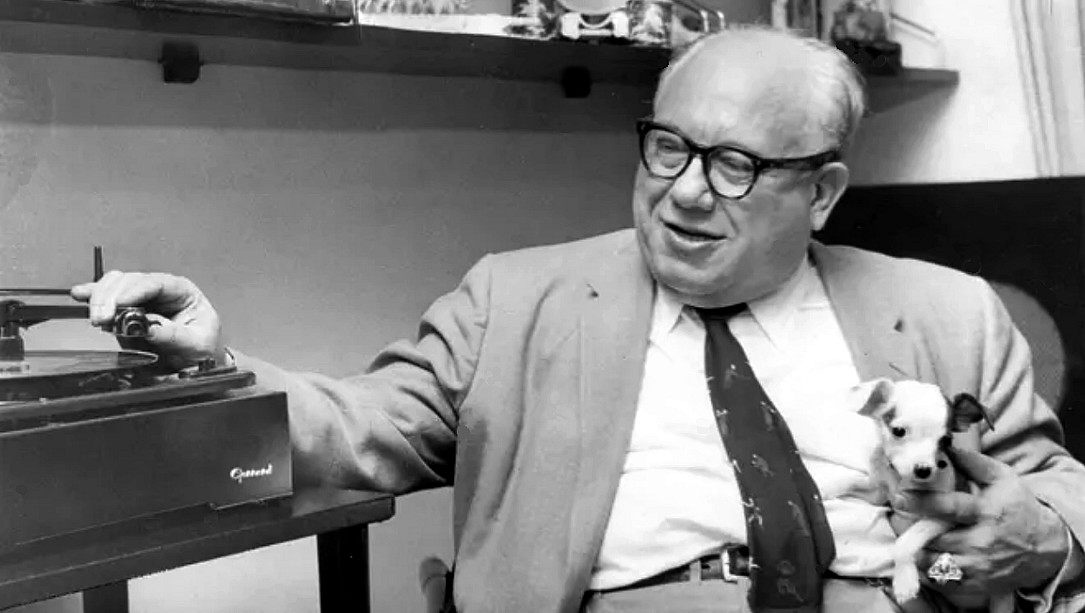
|
Above: Photo of Sydney Nathan, owner and president of King Records. This photo seems to be from the late 1950s, but is that a 78-rpm record on the turntable? The dog can't take its eyes off Nathan's ring.
CINCINNATI ENQUIRER, February 6, 1949:
JUKE–BOX OPERATOR'S $6 DEBT MAKES HILLBILLY HITS
(PART THREE - CONCLUSION)
BY JACK RAMEY The Corporation makes everything it uses except the cartons for shipping records, even reclaims roof water for cooling purposes. In its five buildings enveloping the ice company are hundreds of thousands of dollars' worth of machinery for baking, pressing, electroplating, tabulating, recording, publishing sheet music, bookkeeping.They do their own printing, all the advertising and promotional work for King and its five subsidiaries, Royal Plastic and the Arnel, Blue Ridge, Lois Music, and Blue Ribbon music publishers.
They press records for other corporations. They make their own masters from the acetate and in 24 hours have their own "fathers" and "mothers", the sub-masters for pressing the hundreds of thousands of records.
It's a far cry from the days they tried to set up the first machinery and defective gears flew apart and flywheels broke and kept them dodging.
They have 10,000 accounts. In any single month, 4,500 of the accounts are active. They have 187,000 records on back order.
Almost any night Bull Moose Jackson or Hank Penny or Cowboy Copas or Moon Mullican or Grandpa Jones or Merle Travis may be recording at King Corporation. They may start making popular records. Their new recording room is adaptable to television.
Lois Music Publishing is derived from Lois Mann. Because Lois Mann is none other than Sydney Nathan, who uses the pseudonym for the music he writes. Nathan wrote "Signed, Sealed and Delivered" and "Sweeter Than the Flowers," two of the hillbilly best sellers [*see note 1].
When he sways and sings and then predicts what a song can do, you're ready to wager he's right. He hits on things like Bull Moose Jackson's "I Want A Bowlegged Woman".
He now knows "Money, Marbles or Chalk" is a hit. Although King isn't selling the record as yet. "My money won't spend My marbles won't spin My chalk won't write any more." [*see note 2].
Another hit, something about a fellow who's been around, isn't even named, but he knows it's going to be hot. You can bet on it.
Or the King corporation, built upon hillbilly and sepia and spiritual and folk records produced by a juke box operator's debt, wouldn't be there.
*NOTES:
1. BMI credits Cowboy Copas and Sydney Nathan as co-composers of "Signed, Sealed and Delivered" and Aubrey W. (Moon) Mullican and Sydney Nathan for "Sweeter Than the Flowers". Copas and Mullican are the artists that performed the hit songs. Draw your own conclusions.2. "Money, Marbles And Chalk" was a country and western song by Pop Eckler that was released on King 774 in February 1949. It was released on Decca, Capitol, and Mercury shorty after.
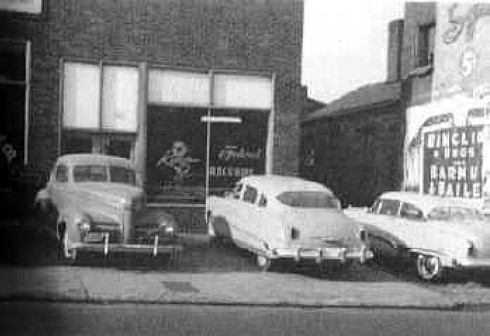
BIXIE CRAWFORD
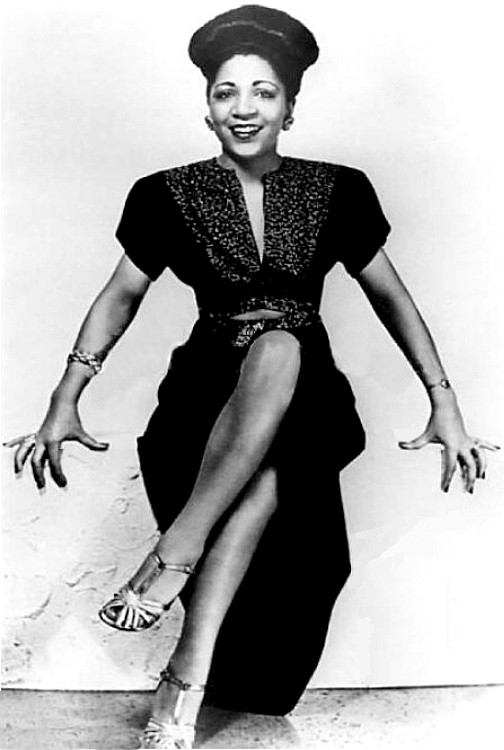
|
Above: Photo of Bixie Crawford. She was born in Oklahoma City in 1923. After her short stay with Buddy Banks in 1949, she became vocalist for the new Count Basie Band in 1952. Bixie was fired when Basie's wife falsely discovered evidence of Bixie making advances toward the Count!
Click HERE for an article about BIXIE CRAWFORD by Marv Goldberg.
(Will open in a separate window)PITTSBURGH COURIER, November 12, 1949:
Lovely Lady—Birdie Harris (aka Bixie Crawford), former Louis Jordan band vocalist who lives in Los Angeles, appeared recently as guest artist on "Adams Alley" Television show. She has also cut several records.NEW YORK AGE, May 12, 1951: ....A sultry songstress from the West Coast and a veteran "horn man" of many jazz circuits — beauteous BIXIE CRAWFORD and ORAN "HOT LIPS" PAGE — are two of the galaxy of Blues and Rhythm stars signed recently by RCA Victor Records in an aggressive move to strengthen the company's position in this important field. BIXIE is the discovery of HENRI RENE, West Coast manager of RCA Victor....
CALIFORNIA EAGLE, June 17, 1954:
Bixie Crawford "Singsational" Count Basie Feature—Vocaluscious Bixie Crawford was "swinging" home this week after a successful tour of five European countries. Tantalizing Bixie is the femme chirp with the Count Basie aggregation and will appear with the maestro at the annual Cavalcade Of Jazz program this Sunday at Wrigley Field.Although now a tune pan alley temptress, Bixie was formerly a Los Angeles schoolmarm. But the news got around that Miss Crawford was well versed with a lyric and had a way of toying with a song. It was in 1951 that RCA Victor Recording Company discovered her rare talent and contracted her for a long run. It was on this label that she etched such torrid sides as "My Man's A Devil" and now "Please Let Me Be" and Bixie's recent [sic] big sounds include "Maybe Some Rainy Day" and "Never To Cry Again." Scrapple from the Apple has it that these sides are jumping juke fare on the eastern seaboard....
(NOTE: The "recent big sounds" were released in July 1949 and September 1953. The named RCA Victor sides came out in 1951.)
NEW YORK AGE, April 10, 1954: Continental Favorite
NEW YORK—Bixie Crawford, curvaceous song stylist with the Count Basie orchestra, is currently the talk of European music centers where she has been appearing with the Count on his current tour of the continent. Music critics have gone out for the lovely Bixie "hook-line and sinker." She returns to the good old U.S.A. next month.NEW YORK AGE, January 29, 1955: Bixie Crawford Hits Road As "Single" Star
NEW YORK—Bixie Crawford, the sensational vocalist, recently featured with Count Basie, this week launched a career as a "single" under management of Tillie Mitchell, well known talent agent. Bixie's initial engagement as a "single" was a two weeks stint at exclusive Club Showtime in Boston, where she was hailed by critics and patrons alike. From Boston the singer will move into the Buffalo area and follow this one with a tour of Canada. (Later bookings will include) cafe stops in Chicago, Detroit and the West Coast. (This article is continued at right)
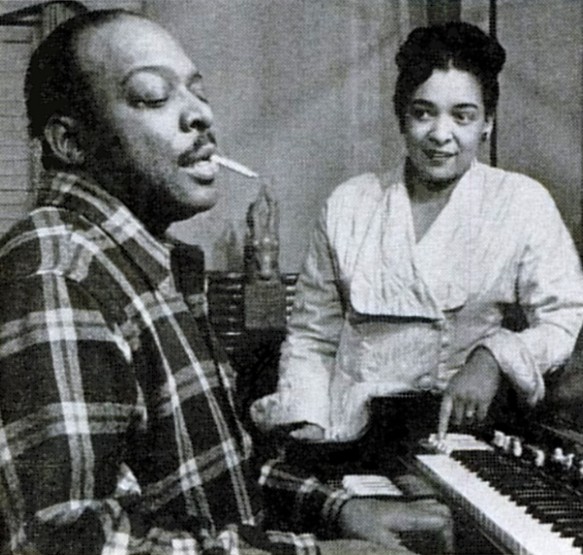
Directly Above: JET MAGAZINE, August 26, 1954. [Count Basie and his wife, Catherine.]
NEW YORK AGE, January 29, 1955: (Continued)
Miss Crawford as a vocalist with several name bands was well liked wherever the orks appeared. She not only pleased as a singer but rated equally as high in personality. She was referred to in many stories as "Miss Vocalist" and compared with the greatest of bandom's singing stars.(NOTE: My guess is that the afore-mentioned Miss Mitchell prepared the above article for the newspapers, or had it handled through a press agent.)
PITTSBURGH COURIER, October 22, 1955:
BACK IN L.A.—Because of the illness of her mother, Mrs. Juanita C. Macklin, Los Angeles civic worker, Bixie Crawford, recent vocalist with Count Basie, left the East Coast to live with her mother for an indefinite period. Mrs. Macklin, well-known for her activities with the Exceptional Children's Opportunity School, is in the process of recovering.
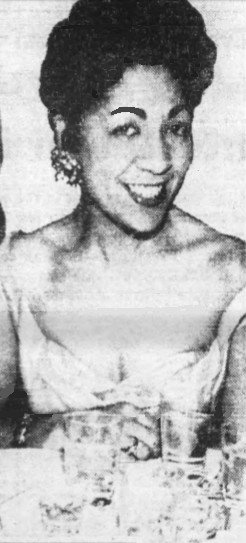
|
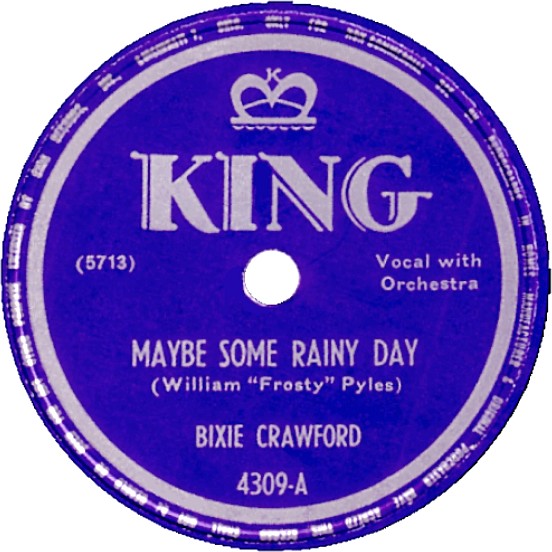
|
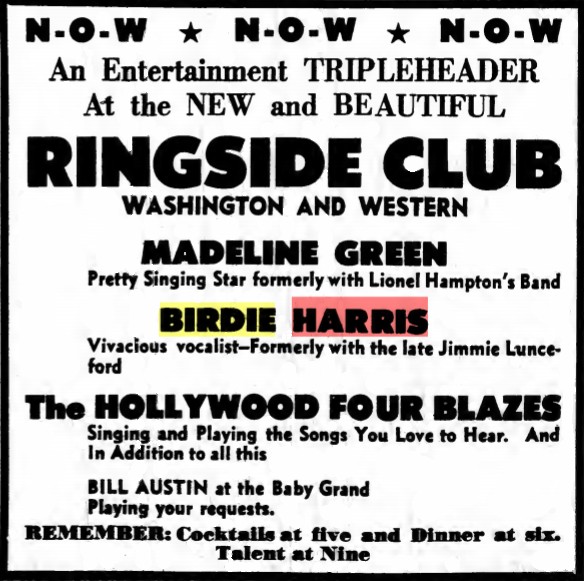
|
Above Left: PITTSBURGH COURIER, November 10, 1956. Above Middle: Label image of King 4309-A, recorded in April 1949 and released in July 1949. Bixie is backed vocally and instrumentally by Buddy Bank's band.
(Label image and audio files provided by Andrew Bohan.)The composer, William "Frosty" Pyles, was the guitar player in Buddy Banks' band. The flip side's composer is Fletcher Smith, who was the piano player in Banks' band at the time.
Above Right: CALIFORNIA EAGLE, November 13, 1947.
NOTE: Birdie Harris is another name for Bixie Crawford.At Direct Right: JET MAGAZINE, September 4, 1952:
Before she joined Count Basie's ork as singer, Bixie Crawford was teaching school in Los Angeles. She holds classes for band members in French and Spanish.NOTE: This was Bixie Crawford's only release on the King label. She also had records on DeLuxe, with Benny Carter (1946), RCA Victor (1951), United (1953), Empire (1956), C-Note (1956), and Indigo (1960).
The Cash Box Review (8/6/49):
BIXIE CRAWFORD — KING 4309....Maybe Some Rainy Day/Be Fair With Me
Chirp Bixie Crawford displays some good vocal tones on this pair tagged "Maybe Some Rainy Day" and "Be Fair With Me." Wax is a pleasant offering that should do well on music ops' machines.Top deck, a slow teasin' blues number has the gal spooning some mellow vocal allure in strong, sultry tones that score. The flip maintains the same tempo, with Bixie turning in an effective bit of vocal work on the side. Ops should listen in.
The Billboard Review (8/13/49):
BIXIE CRAWFORD — KING 4309....
Maybe Some Rainy Day (67) Vocal group with ork lend adequate support to the new gal chirp who can gliss 'em just right. So-so tune, tho.
(NOTE: In music, gliss is a glide from one pitch to another.)
Be Fair With Me (67) Material seems to be holding back the breathy style of Crawford gal.(NOTE: A ratings range of 40-69 was considered "satisfactory.")
LISTEN (Windows Media Player):
1. "Maybe Some Rainy Day" - Bixie Crawford (With Buddy Banks And His Notes) - King 4309-A - 1949.
2. "Be Fair With Me" - Bixie Crawford (With Buddy Banks And His Notes) - King 4309-AA - 1949.BOTH SONGS played in sequence.
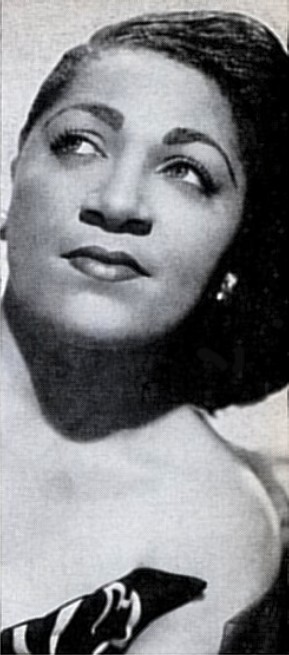
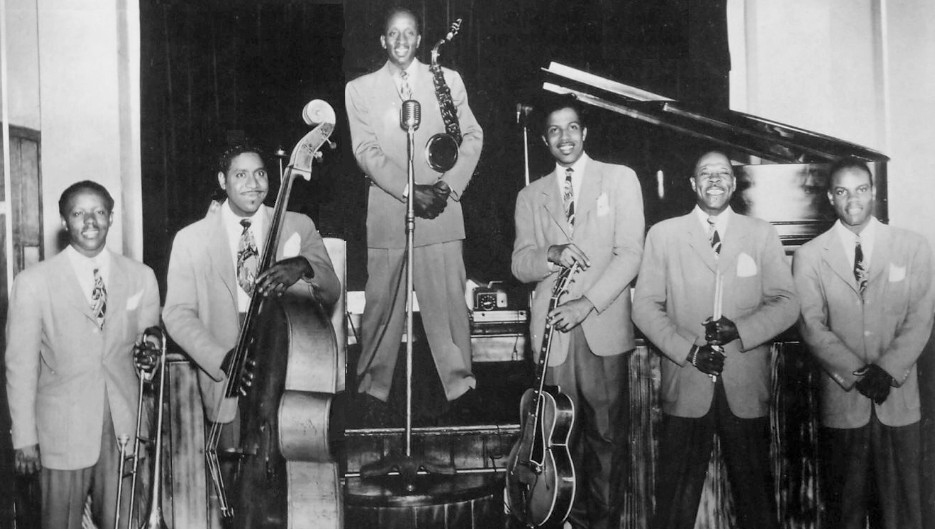
|
Above: 1945 photo of the Buddy Banks Sextet (L-R) Wallace "Wiley" Huff (trombone), William "Basie" Day (bass), Ulysses "Buddy" Banks (tenor saxophone),
William "Frosty" Piles (guitar), Nat "Monk" McFay (drums), and Joe "Earl" Knight (piano). Fletcher Smith replaced Earl Knight on piano for the King session.
EXTRA RECORD — BIXIE HARRIS (AKA BIXIE CRAWFORD)
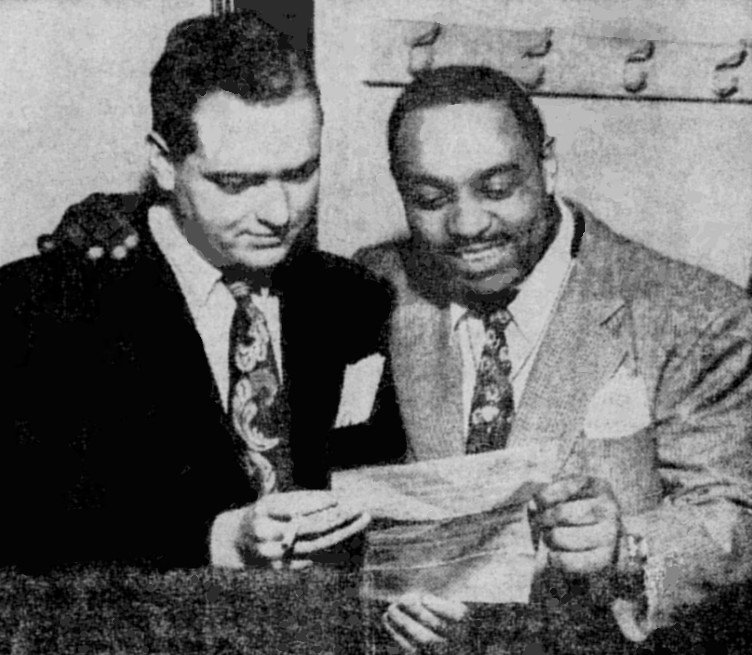
|
Above: ST. LOUIS ARGUS, March 1, 1946:
BENNY CARTER (on right) and manager Milton Deutsch discussing the new future of promise after signing contract with Joe Glaser Agency.
DETROIT (Calvin's News Service)—Benny Carter, famed bandleader and arranger, left here this week after signing a management contract with the Joe Glaser Agency. He was formerly with the General Amusement Corp:Finishing a week at the Downtown Theatre, Benny Carter went straight to Los Angeles, where additions will be made to the band before another tour.
Besides breaking with his booking agency, General Amusement, Benny severed relations with Capitol Records. Already he has made several dates for DeLuxe Recording Company in New Jersey, the first release being "Patience And Fortitude" and "Jump Call" [released in January 1946].
(NOTE: When with Capitol, Benny's featured female vocalist was Savannah Churchill.)
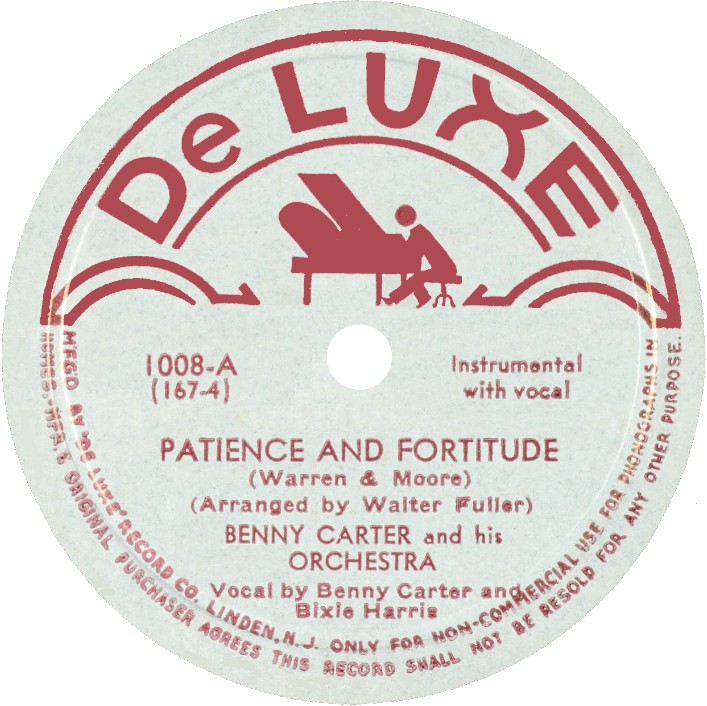
|
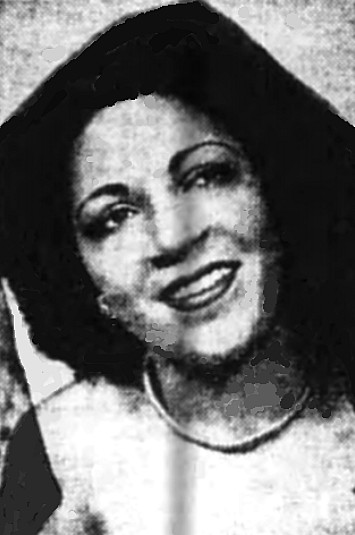
|
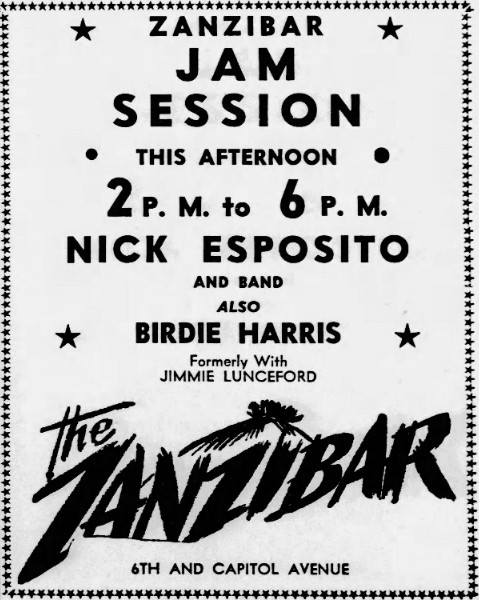
|
Above Left: Label image of DeLuxe 1008-A, released in January 1946. Bixie Harris is aka Bixie Crawford. The same is true for Birdie Harris. Above Middle: PITTSBURGH COURIER, November 12, 1949:
Lovely Lady — Birdie Harris, former Louis Jordan band vocalist who lives in Los Angeles, appeared recently as guest artist on "Adams Alley" Television show. She has also cut several recordings.
[NOTE: These recordings would be for King Records.]Above Right: SACRAMENTO UNION, September 14, 1947.
NOTE: Birdie Harris (Bixie Crawford) had been with Jimmie Lunceford's orchestra earlier in 1947.The Billboard Review (2/2/46):
BENNY CARTER — DeLuxe 1008....Patience And Fortitude/Jump Call
Leeds' (pub firm) has great hope for "P and F", counting on the ex-Mayor LaGuardia–:Deems Taylor–Leonard Feather newsreel publicity on the tune to get it enough hearings to sell. And this platter of it (first one released and Carter's first for DeLuxe) may help do the trick.The Walter Fuller arrangement has the quality that has made other Negro hits and the Benny Carter-Bixie Harris vocals carry it out In the same vein. Band, paced by Carter, turns in its usual proficient jive job.
"Jump Call", a Carter original on the reverse side, is flashier than "P and F" and features a solid trumpet ride, plenty sax and piano noodling that makes good listening of its kind.
For race locations this disk is a cinch and it just might catch on in the ofay [white] spots as well.
Cash Box Review (2/18/46):
BENNY CARTER — DeLuxe 1008....Patience And Fortitude/Jump Call
This waxing of "Patience and Fortitude" is a real good one and perfect for the juke trade. Just to jog your memory, the title is the battle cry used by Mayor LaGuardia of New York during the war in his pleas to Americans to keep a stiff upper lip.Benny Carter does the vocal, with an assist by Bixie Harris, and it's good. The tune is getting quite a play now on the air and with dance bands, so you can mark this waxing down as a surefire seller in the cash boxes.
On the flip-over, "Jump Call", Benny and his crew do a jazz instrumental along the lines of "Tiger Rag" and "Bugle Call." It could be these two numbers with variations, but let the listener decide that for himself.
Both sides of the disk are good.
BLACK DISPATCH (Oklahoma City, Oklahoma), January 24, 1948:
COUNT BASIE VOCALIST GUEST OF RELATIVES
"Birdie Harris", vocalist for Count Basie and his orchestra, was the house guest of her aunt, Mrs. Effie Harrison during the orchestra appearance here on January 12th and 13th.
[NOTE: Wonder if the name "Harris" was derived from "Harrison"?]"Birdie" is a former Tulsa girl, also a graduate of Lincoln University. Her friends will remember her as Birdie Hairston. She now resides in Los Angeles.
On Sunday night, January 19, Miss Harris returned to the city when the band made an overnight stop enroute to a two weeks engagement in Texas.
LISTEN (Windows Media Player):
"Patience And Fortitude" - Benny Carter Orchestra (Vocal By Benny Carter, Bixie Harris, And Band) - DeLuxe 1008-A - 1946.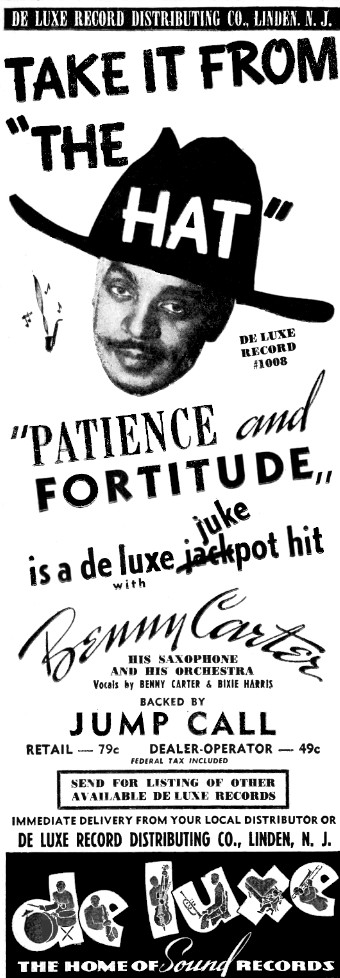
THE BILLBOARD — FEBRUARY 9, 1946
WILD BILL MOORE
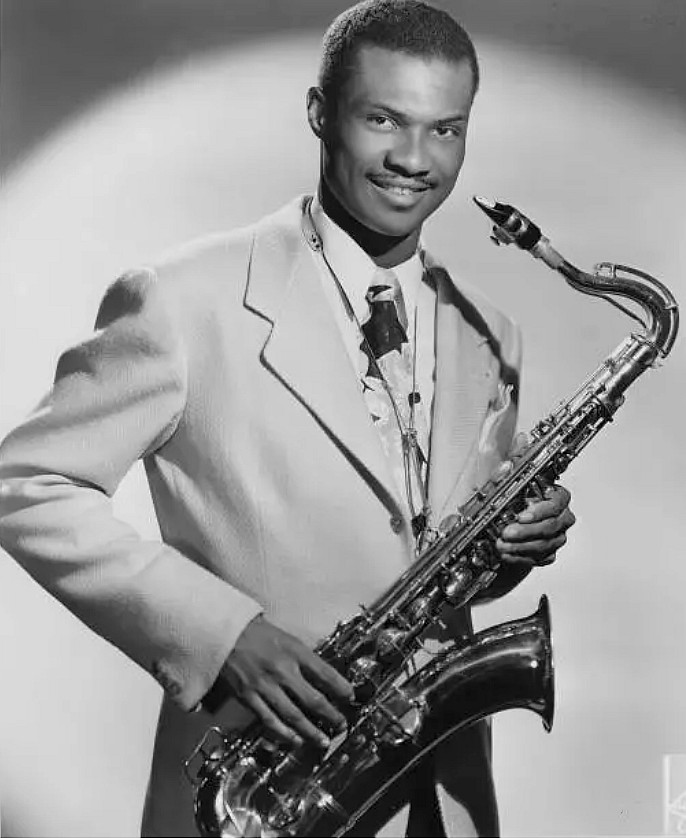
|
Above: Wild Bill Moore, from Detroit, was an alto and tenor saxophone player, arranger, songwriter, and bandleader. He had records on Bop (1947), Savoy (1947-1948), Sensation (1949), Modern (1949), and King (1950).
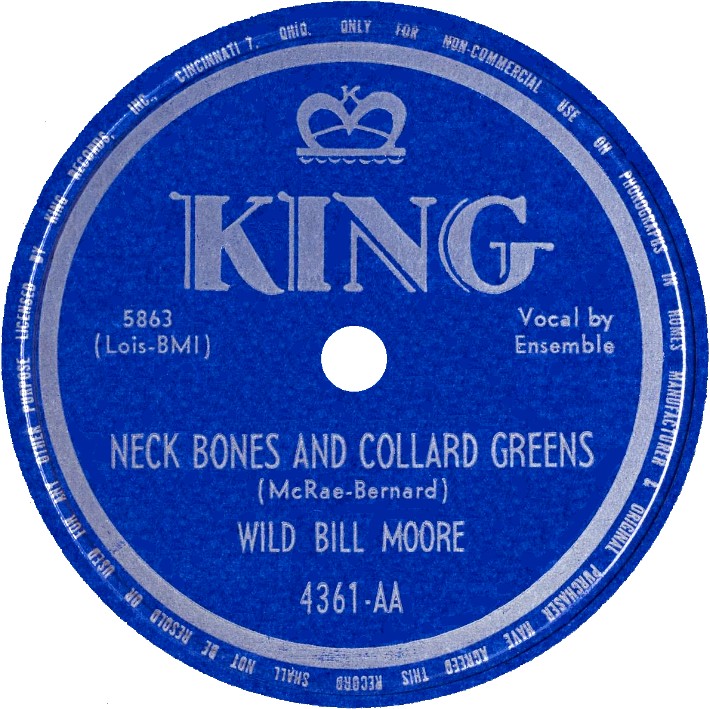
|
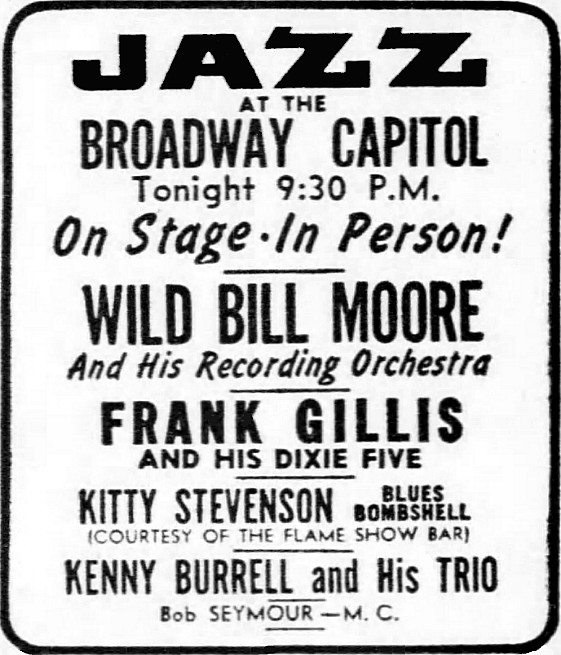
|
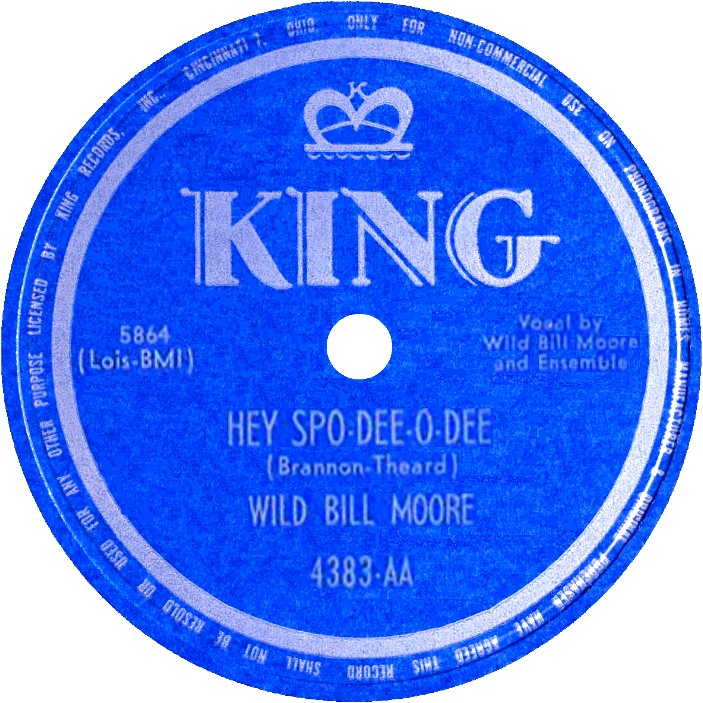
|
Above Left: Label image of 4361-AA, released in 1950. Above Middle: DETROIT FREE PRESS, May 27, 1950.
NOTE: You will hear from Kitty Stevenson further down this webpage.Above Right: Label image of King 4383-AA, released in 1950.
The flip-sides of the above two records are instrumentals.At Direct Right: Photo of Wild Bill Moore.
CASH BOX, April 12, 1947: KING RECORDS ADDS TO ARTIST ROSTER
CINCINNATI—King Records announced this week the signing of "Wild" Bill Moore in the Blues and Rhythm catalog.... Wild Bill Moore is a tenor sax man distinguished in the sepia field for his last hit, "Bubbles". His first cookies will be out by the end of this month.CALIFORNIA EAGLE, February 3, 1949: A BOOKING HEADACHE
NEW YORK—A few years ago "Wild Bill" Moore, one of the country's top recording artists, whose Savoy platter "Bubbles" sold over 750,000, didn't have a spare dime to his name. He had been playing with bands around the country without so much as a quiver of recognition.On a hunch, Bill made his own recording of "Bubbles" using the arrangement he'd been developing through months of playing the tune. He stuck the record under his arm and took it around to every radio station in a 50-mile radius of New York. All of them turned it down.
That night he walked into the Baby Grand to join a jam session. Naturally, he blew his pet "Bubbles". At the conclusion of the number a man walked over to Bill and introduced himself as the owner of a record company (Savoy) and asked Bill to record it for him.
Today he's a booking headache... because every town in the country wants him.
Cash Box Review (7/22/50):
WILD BILL MOORE — King 4383....Hey Spo-Dee-O-Dee/Balancing With Bill
Mellow echo of the top deck should account for a fair shake of coin play for music ops. Wild Bill Moore's hot warbling, backed with an ensemble here, is just the right sort of up tempo stuff that'll do well in the phonos. Flip side is an instrumental bit, with the maestro tearing off a lick on sax. We like the top deck.LISTEN (Windows Media Player):
1. "Neck Bones And Collard Greens" - Wild Bill Moore (And Ensemble) - King 4361-AA - 1950.
2. "Hey Spo-Dee-O-Dee" - Wild Bill Moore (And Ensemble) - King 4383-AA - 1950.BOTH SONGS played in sequence.
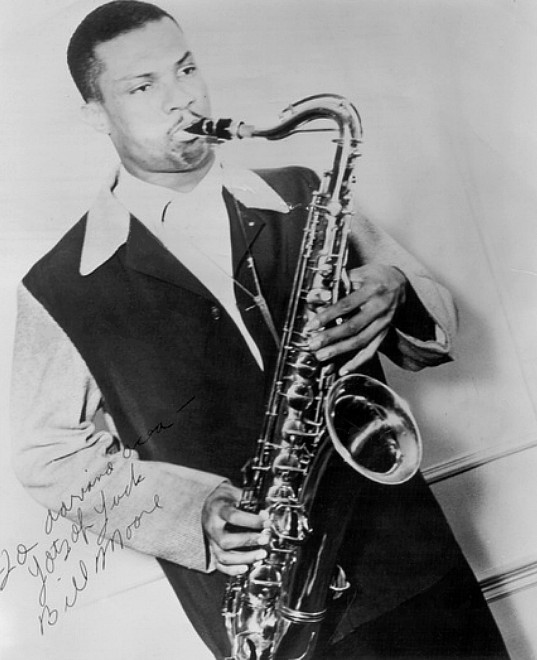
EXTRA RECORD — WILD BILL MOORE
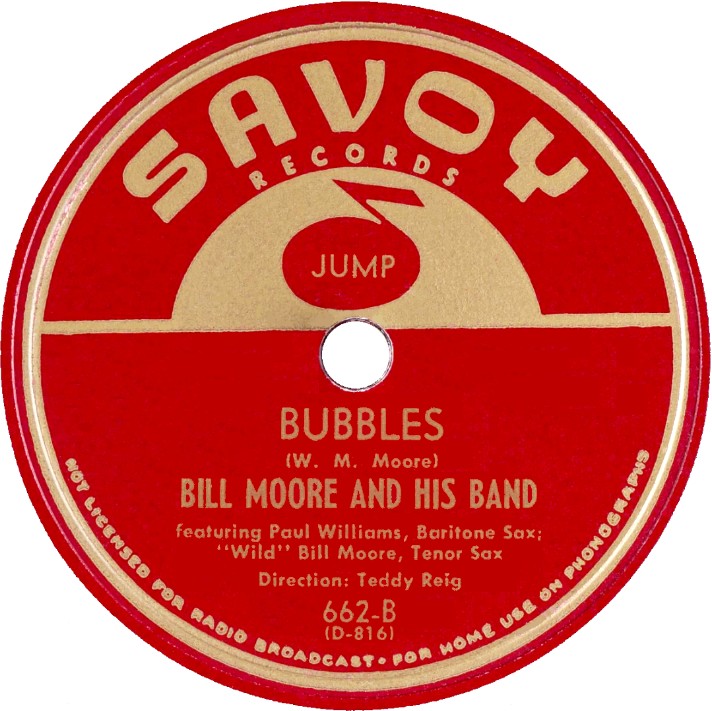
|
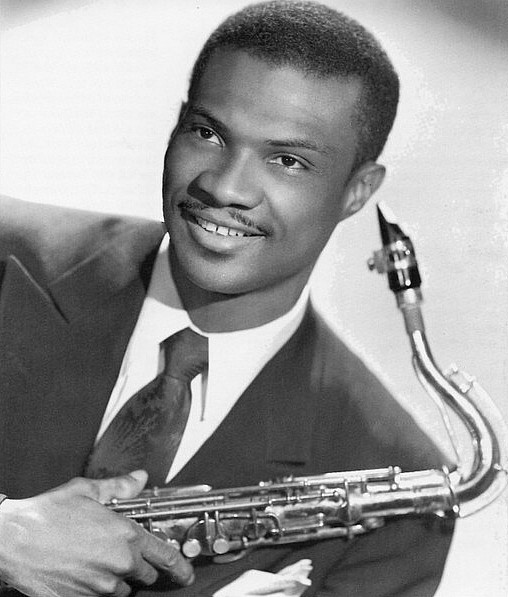
|
Above Left: Label image of Savoy 662-B, recorded in Detroit on November 21, 1947 and released in 1947. BMI.com lists 409 "Bubbles" song titles. "W. M. Moore" is shown as composer of one of those, plus 4 other songs, including "We're Gonna Rock". Above Right: Photo of Wild Bill Moore.
Cash Box Review (1/3/48):
WILD BILL MOORE — Savoy 662....Bubbles/Swingin' For Pappy
Pair of hep instrumental sides for the crowd that loves to let loose are offered here on this duo by the Bill Moore ork. Top deck features a slow winding sax, with a heavy bounce beat that makes for mellow listening time. On the flip, with "Swingin' For Pappy", the combo come thru again with the beat offered picked up.The crew show with loads of riff spots that add up to a merry chain of coin play.
LISTEN (Windows Media Player):
"Bubbles" - Bill Moore And His Band - Savoy 662-B - 1947.
SONNY THOMPSON AND LULA REED
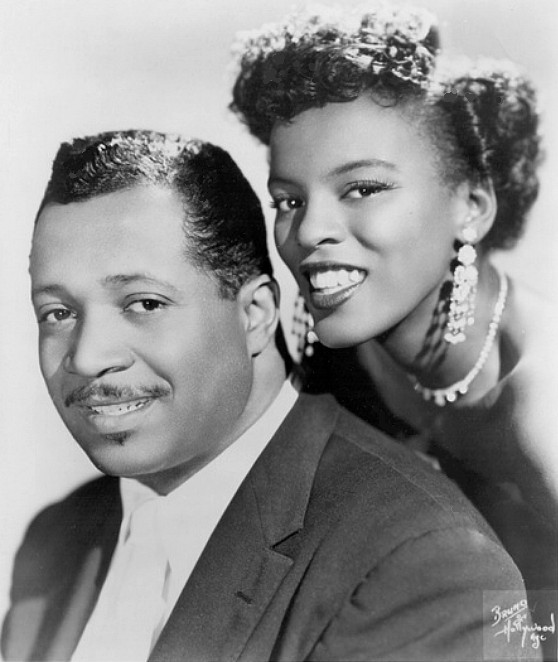
|
Above: Sonny Thompson And Lula Reed. Sonny was a pianist, songwriter, arranger, and bandleader. Lula was his featured female vocalist and his wife.
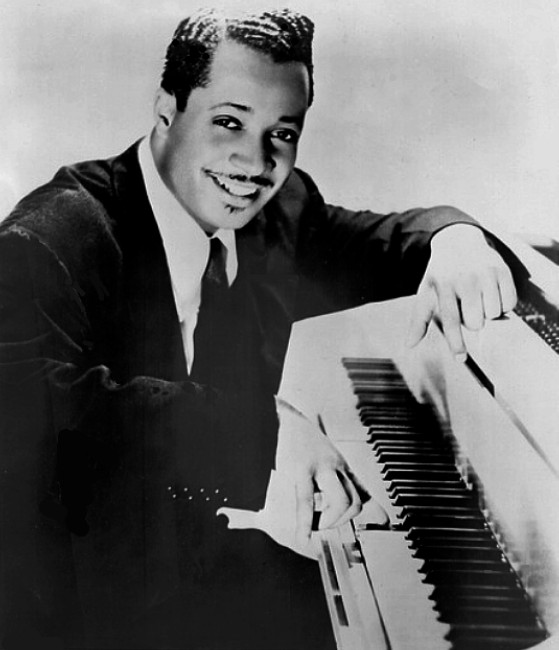
|
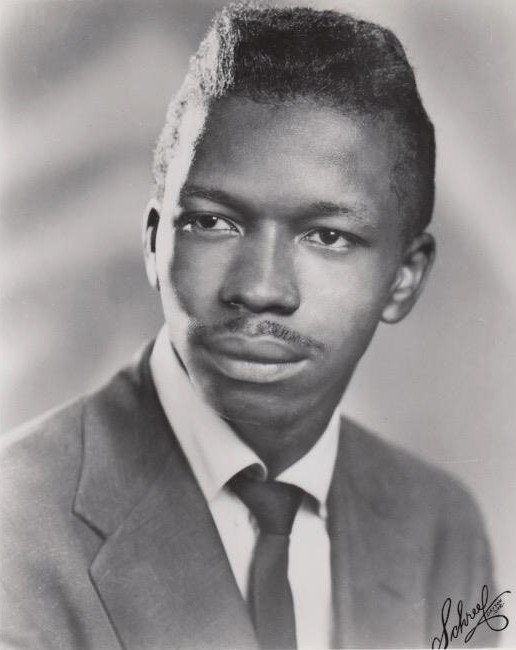
|
Above Left: Circa 1951 photo of Sonny Thompson at the piano. Above Right: Photo of Paul Tate, featured male vocalist in Thompson's band and the vocalist on "I'm Beggin' And Pleadin'".
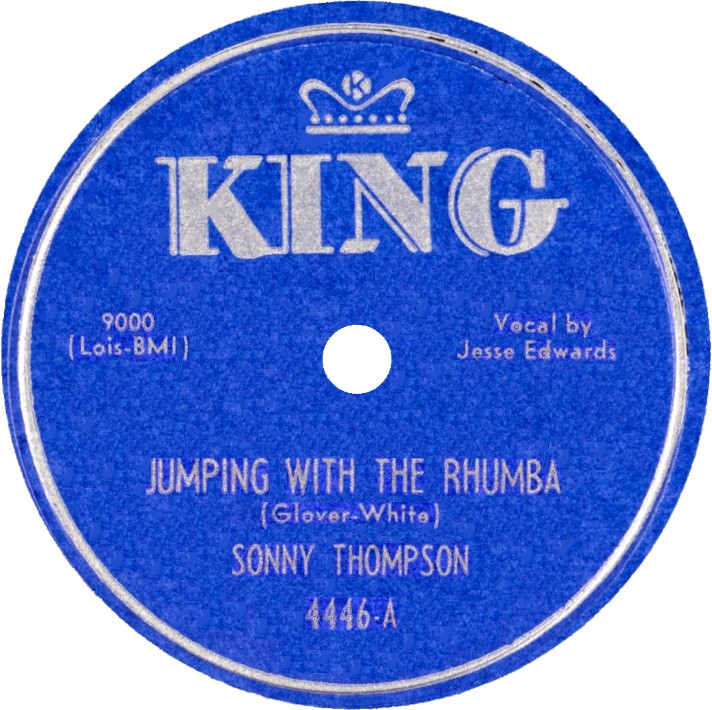
|
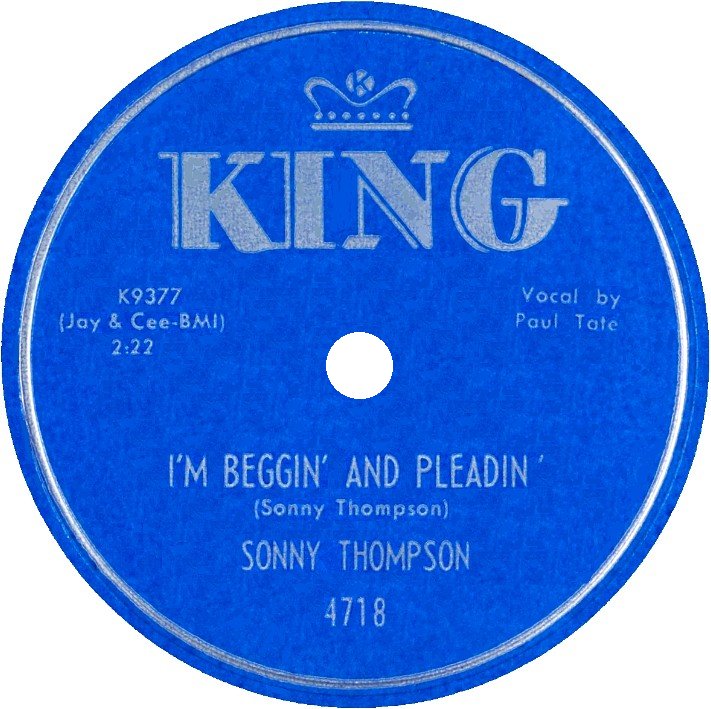
|
Above Left: Label image of King 4446-A, released in 1951. "Jumping With The Rhumba" is done in a "Saturday Night Fish Fry" style. The song was composed by Henry Glover and Wilhelmina White. It's Wilhelmina's only song title listed at BMI.com. Of course, Henry was the in-house songwriter for King Records, among other duties.
Above Right: Label image of King 4718, released in 1954. The vocalist, Paul Tate, does a very nice job with this one. BMI.com credits Sonny Thompson as the lone composer. Sydney Nathan must have been on vacation.
At Direct Right: MOBERLY MONITOR EVENING DEMOCRAT (Moberly, Missouri), December 27, 1955.
Cash Box Review (6/5/54):
SONNY THOMPSON — KING 4718
I'm Beggin' And Pleadin' (C+) Paul Tate handles the vocal end of a slow blues in true blues fashion. The Sonny Thompson ork supplies the instrumental support with the proper feeling.
Single Shot (B) The ork bounces through a rhythmic lively instrumental ditty with spark. Enjoyable spirits lifter.(NOTE: A rating of C+ was considered as "good" and B as "very good".)
The Billboard Review (6/5/54):
SONNY THOMPSON — KING 4718
Single Shot (72) A bright, listenable instrumental that generates considerable excitement with its fine dance beat and its swingy riff.
I'm Beggin' And Pleadin' (67) Paul Tate is the vocalist on this side. He pleads in this routine weeper with his girl to reconsider her decision to leave him.(NOTE: Ratings had a range of 0-100 with 60-69 considered as "satisfactory" and 70-79 as "good".)
THE BILLBOARD, August 13, 1955:
....Another group Universal is booking heavily is the unit made up of the Sonny Thompson ork, Lula Reed, the Champions vocal group and blues singer Paul Tate (12 in all). They are booked thru Christmas and will be in the South and Southwest this month and September, and on the West Coast from October thru December. Unit closed this week in Atlantic City....LISTEN (Windows Media Player):
1. "Jumping With The Rhumba" - Sonny Thompson (Vocal By Jesse Edwards) - King 4446-A - 1951.
2. "I'm Beggin' And Pleadin'" - Sonny Thompson (Vocal By Paul Tate) - King 4718 - 1954.BOTH SONGS played in sequence.
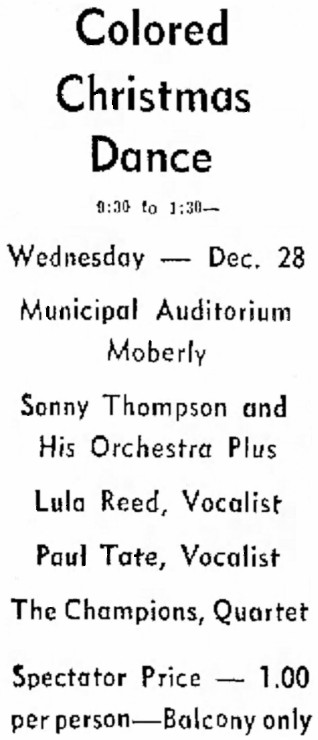
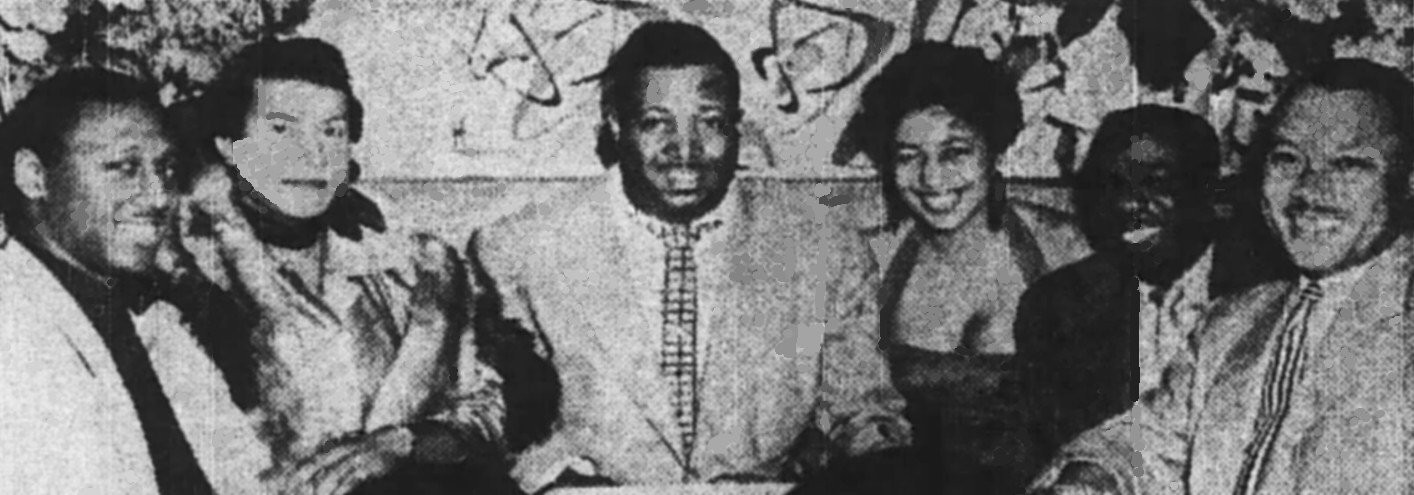
|
NEW PITTSBURGH COURIER, November 21, 1953:
(Above L-R) James Arnold, manager of Sonny Thompson's orchestra; Asuree Edwards, West Coast lassie; bandleader and record star Sonny Thompson; Mary Dee, Pittsburgh disc jockey; Shorts Davis, noted dancer; and Herschell Bayless of Cincinnati, Ohio.
THE CALL (Kansas City, Missouri), July 31, 1953:
SONNY "MELLOW BLUES" THOMPSON AND LULA REED COMING TO MOBERLY
MOBERLY, Missouri—America's youngest and most talented songstress will be on hand Monday, Aug. 4.Here's the attraction that has evoked so much enthusiasm among promoters, press representatives, and diversion seekers throughout the country that many predict that it will become the foremost entertainment presentation in all America.
Sonny Thompson's band has rhythm, blues, and melodic high pitch. It can be summed up in this manner: every musician in the aggregation is a musician's musician. Lula Reed, the singing star, will still be rated tops long after many of the current raves are set and buried in the remember-me-when's scrapbooks perhaps 20 or more years from now. Yes, she's that good.
Thompson annexed the Sepia Song Hit Parade trophy two years in a row. Lula Reed, who had been up on the big time but one year, won the Pittsburgh Courier Award of Achievement as an outstanding performer... and it goes without saying that the terrific box office power of the Sonny Thompson (triple-threat) combination is away above the average of top name bands. [The third "threat" was harmonica playing blues singer Little Walter, who was on tour with Sonny at the time.]
Having annexed the Sepia Song Hit Parade Trophy for 1953 for a song ("Mellow Blues") which he himself composed [with Henry Glover], Sonny Thompson is moving up. The hit song didn't get a look-see after its release on King Records. It wasn't until Thompson had "hit the road" with the band on a tour cross-country that it caught on and spread like wild-fire.
"Mellow Blues" stood in fifth place 10 weeks, hopped to fourth for another six and then, believe it or not, alternated almost every other week for 16 weeks and then climbed to the top and stood there for seven weeks.
Actually, 39 weeks on a top-rating list would be termed some sort of an unheard of status for a song. "Mellow" did better than that. For after being in first place for seven weeks, it was among the Golden Dozen 10 weeks....
LISTEN (Windows Media Player):
1. "Mellow Blues—Part 1" - Sonny Thompson - King 4488-AA - 1951.
2. "Mellow Blues—Part 2" - Sonny Thompson - King 4488-A - 1951.BOTH SONGS played in sequence.
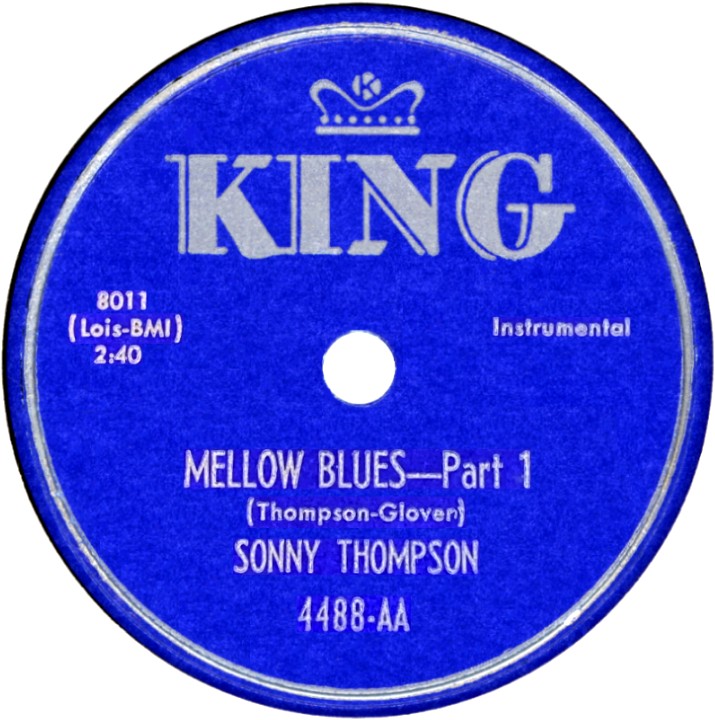
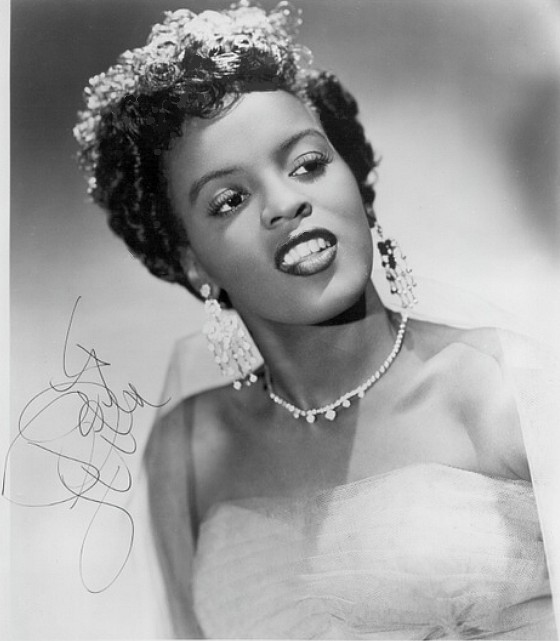
|
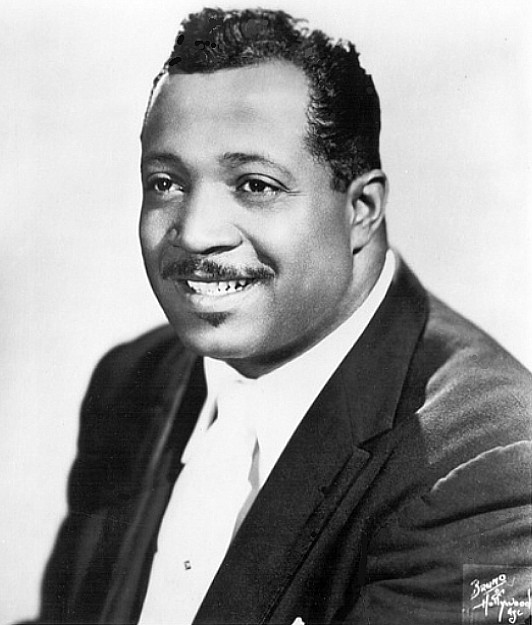
|
Above Left: Lula Reed. That's not scribbling in the lower left. Well, it is, but it says "Best Lula" (or is it "Lulu"?). Both "Lula" and "Lulu" are used as a nickname for "Louise". Above Right: Sonny Thompson
CASH BOX, November 15, 1952:
.... Sonny Thompson, with five pieces and Lula Reed to do the chirping, played Minneapolis last week to a packed house. Group is working coastward....
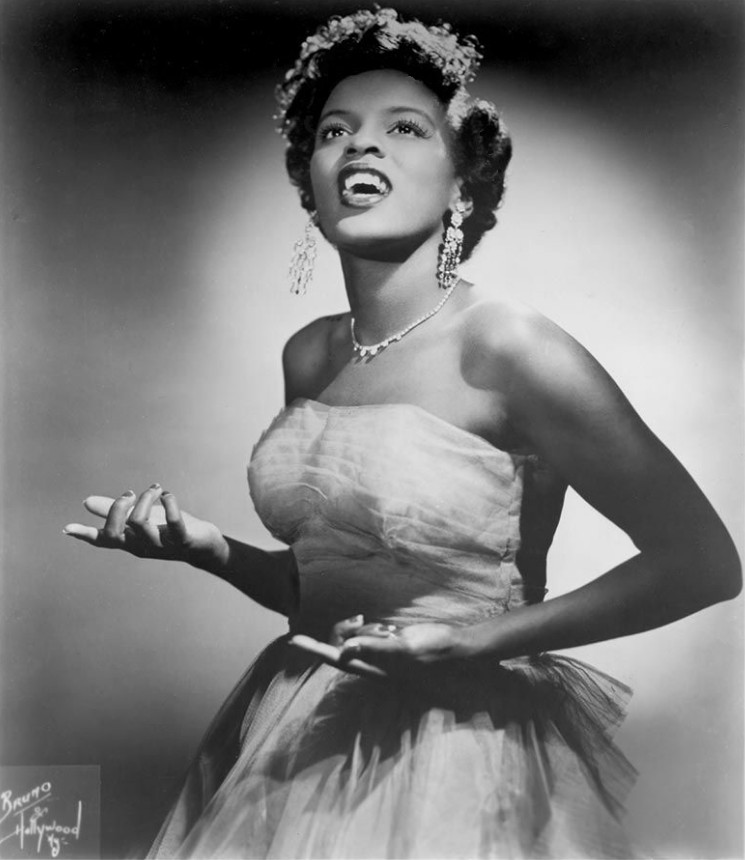
|
Above: Lula Reed.
JET MAGAZINE, January 22, 1953:
LULU REED CALLED MUSICAL "FIND OF YEAR"
(NOTE: "Lula" is named "Lulu" in the actual article, not unusual at the time.)Lulu Reed, a pretty, 22-year-old vocalist who was singing in a Port Clinton, Ohio, church choir a year ago, was acclaimed by recording officials and disc jockeys as the singing "find of the year".
After racking up five successive song hits as a vocalist for the Sonny Thompson band (I'll Drown In My Tears, My Story, My Mother's Prayers), Lulu was awarded a gold record of each of the five songs she made juke box favorites for King Records and was named "Girl of the Year" by the Southwest Association of Disk Jockeys.
A big favorite among the servicemen, at home and abroad, she was voted "Favorite Pinup Girl" by GIs at Fort Smith, Ark. Lulu got her big break early in 1952 when she outsang 50 other contestants for the vocal spot with the Thompson band In Toledo, Ohio.
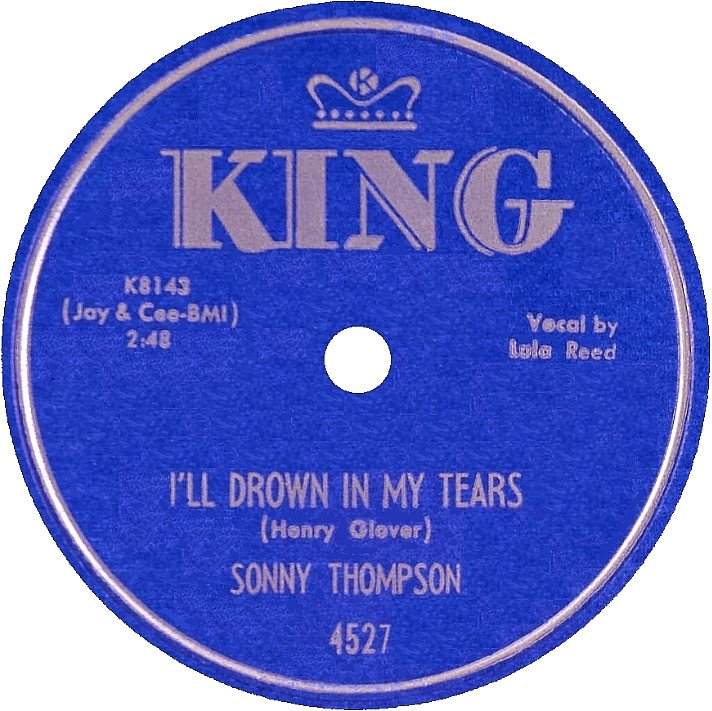
|
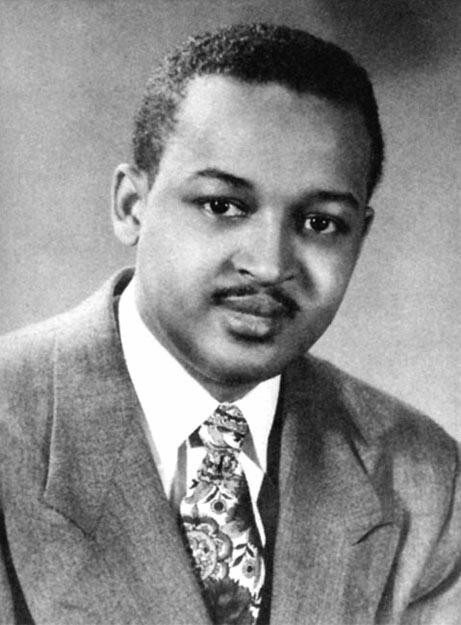
|
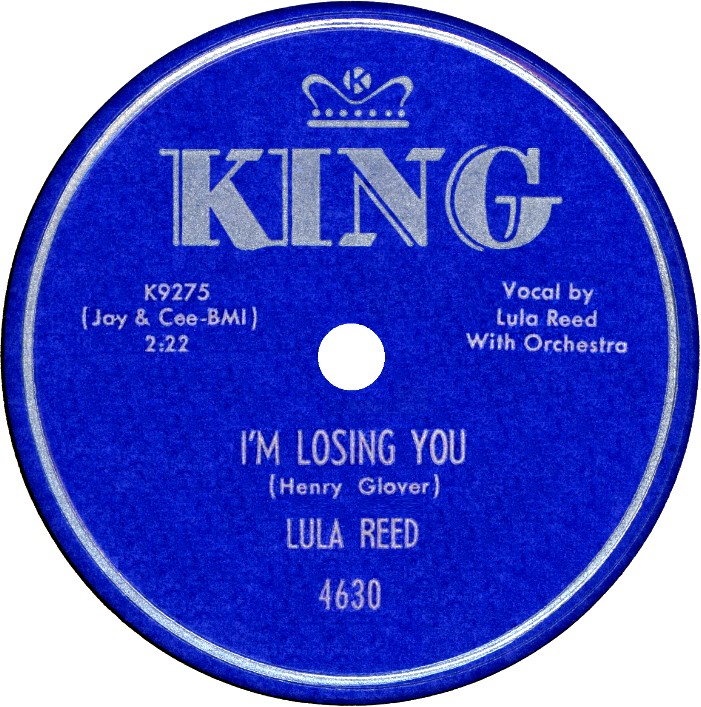
|
Above Left: Label image of King 4527, released in 1951. The flip-side is an instrumental. BMI.com lists 25 artists as performers of "I'll Drown In My Tears", including Ray Charles, Dinah Washington, Etta James, Bobby Darin, Aretha Franklin, Janis Joplin, and Stevie Wonder. Above Middle: Henry Glover was the top a&r man at King Records. He also was a prolific and highly successful songwriter.
BMI.com credits Henry with 633 song titles, 18 of them "BMI Award Winning Songs". These include "Annie Had A Baby", "D' Natural Blues", "Honky Tonk", "I'll Sail My Ship Alone", "Let The Little Girl Dance", "Peppermint Twist", and "Rock Love".
Above Right: Label image of King 4630, released in 1953. "I'm Losing You" has a similar piano sound as The Swallows on King. The Swallows will be featured in Part Five of this article.
Note, that at this point, Lula Reed gets top billing on the label. The flip-side of this record, "My Poor Heart", was composed by Sonny Thompson.
At Direct Right: Sonny Thompson and Lula Reed performing.
The Cash Box Review (4/19/52):
SONNY THOMPSON — KING 4527....Clang Clang Clang/I'll Drown In My Tears
Sonny Thompson and his group present a fast instrumental bounce that is solidly arranged. Thompson's exciting chord sweeping is ably backed up by bassist, Lloyd Trotman, who also wrote the tune. Les Erskine excels on the drums.Flip is a slow blues, excellently rendered by the group, with Lulu [sic] Reed turning in a dynamic vocal.
LISTEN (Windows Media Player):
1. "I'll Drown In My Tears" - Sonny Thompson Orchestra (Vocal By Lula Reed) - King 4527 - 1952.
2. "I'm Losing You" - Lula Reed - King 4630 - 1953.
3. "My Poor Heart" - Lula Reed - King 4630 - 1953.ALL THREE SONGS played in sequence.
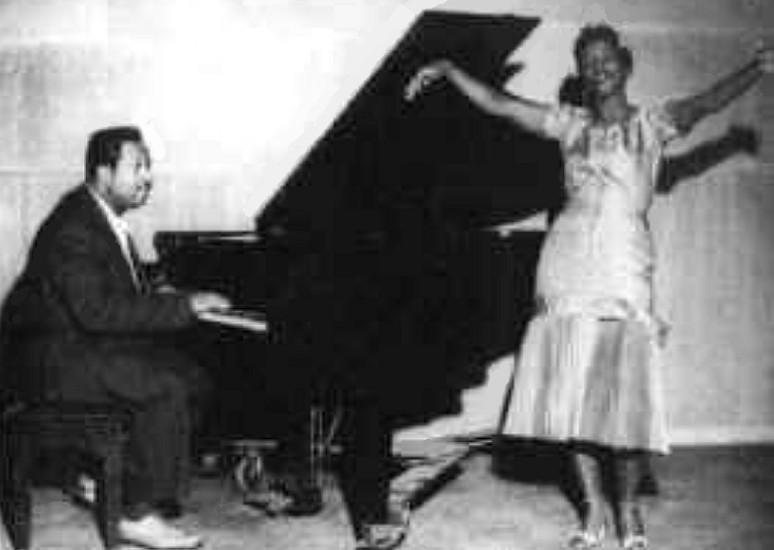
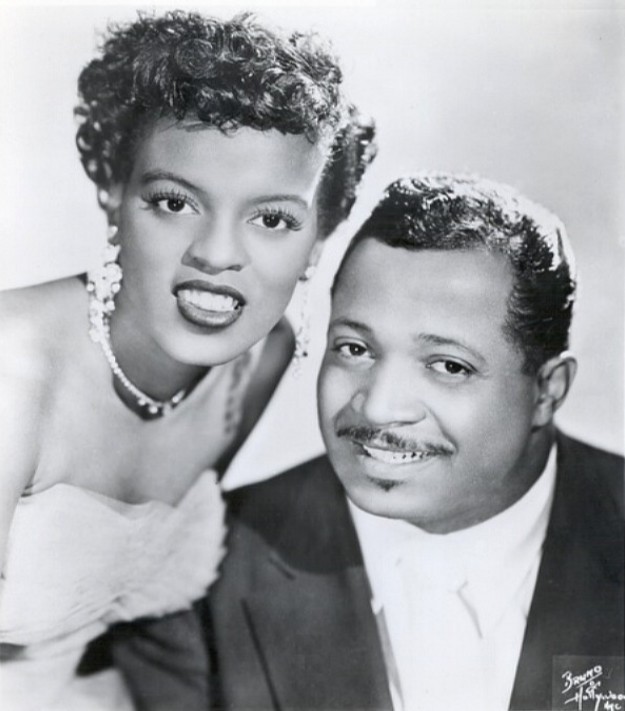
|
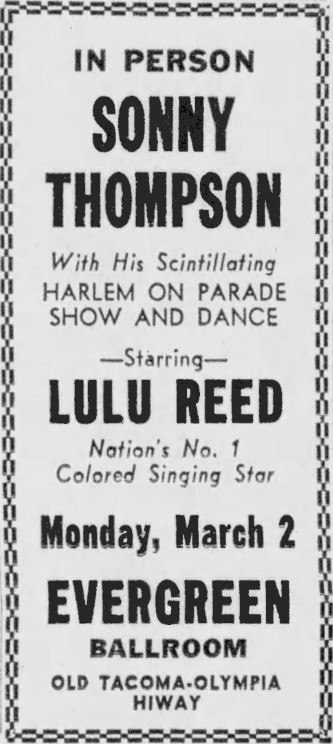
|
Above Left: Lula Reed and Sonny Thompson. Sonny's two-year marriage to Thomasena ended with an annulment in 1953. He married Lula in March 1954. Above Right: NEWS TRIBUNE (Tacoma, Washington), February 27, 1953.
NOTE: It was common for the newspapers to spell her name "Lulu" in place of "Lula". It's interesting that she did use the "Lulu" name later for her Argo releases. The Santa Barbara News showed her name as "Hula" in a 1953 clipping.
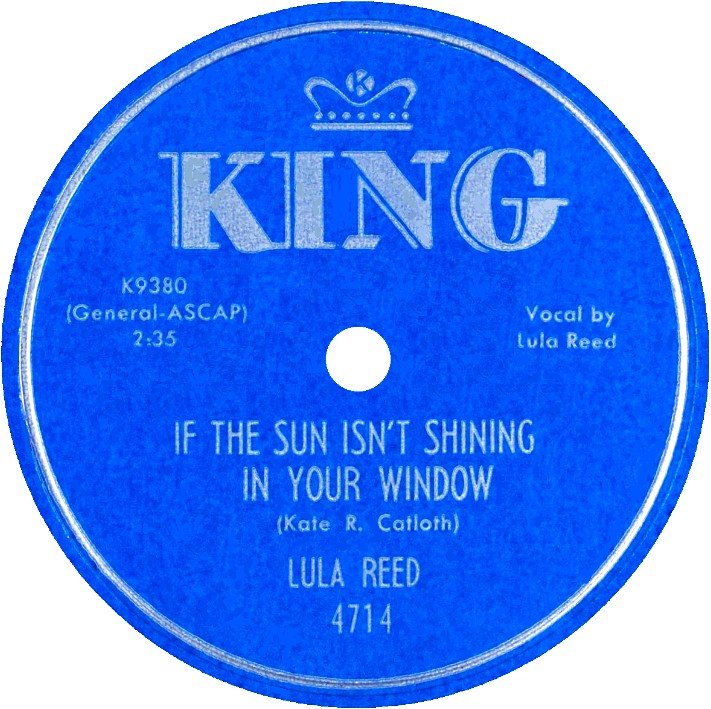
|
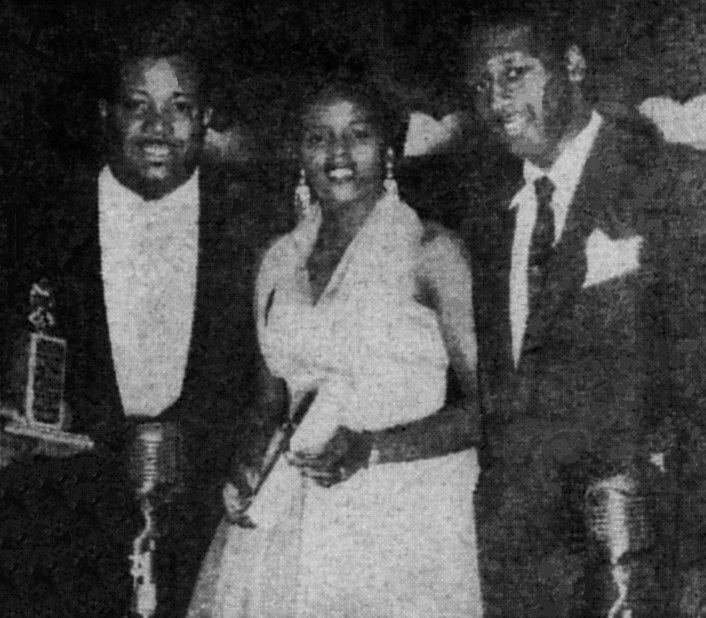
|
Above Left: Label image of King 4714, released in 1954. The flip-side, "Just Whisper", was also released by The Du Droppers (Groove) and Savannah Churchill with a vocal quartet (Decca) in 1954. Above Right: ARIZONA SUN (Phoenix, Arizona), July 31, 1953:
Bandleader Sonny Thompson, vocalist Lula Reed, and the musical aggregation's business manager Jimmy Arnold pose for our N.Y. correspondent Ted Yates, who took this pix when the band was playing Philadelphia and setting an attendance record at The Club Showboat there.THE BILLBOARD, May 15, 1954: REVIEW SPOTLIGHT ON...
If The Sun Isn't Shining In Your Window/Just Whisper - King 4714
Lulu [sic] Reed does a sincere job here with two new tunes on a spiritual kick. She sells them with conviction and both sides could make it in both the r.&b. and the spiritual market.LISTEN (Windows Media Player):
1. "If The Sun Isn't Shining In Your Window" - Lula Reed (With Vocal Group) - King 4714 - 1954.
2. "Just Whisper" - Lula Reed (With Vocal Group) - King 4714 - 1954.BOTH SONGS played in sequence.
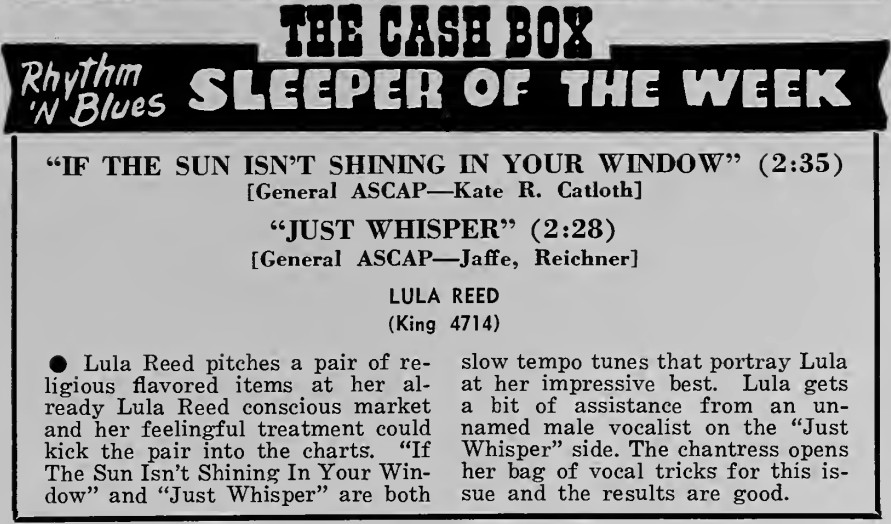
|
TODD RHODES
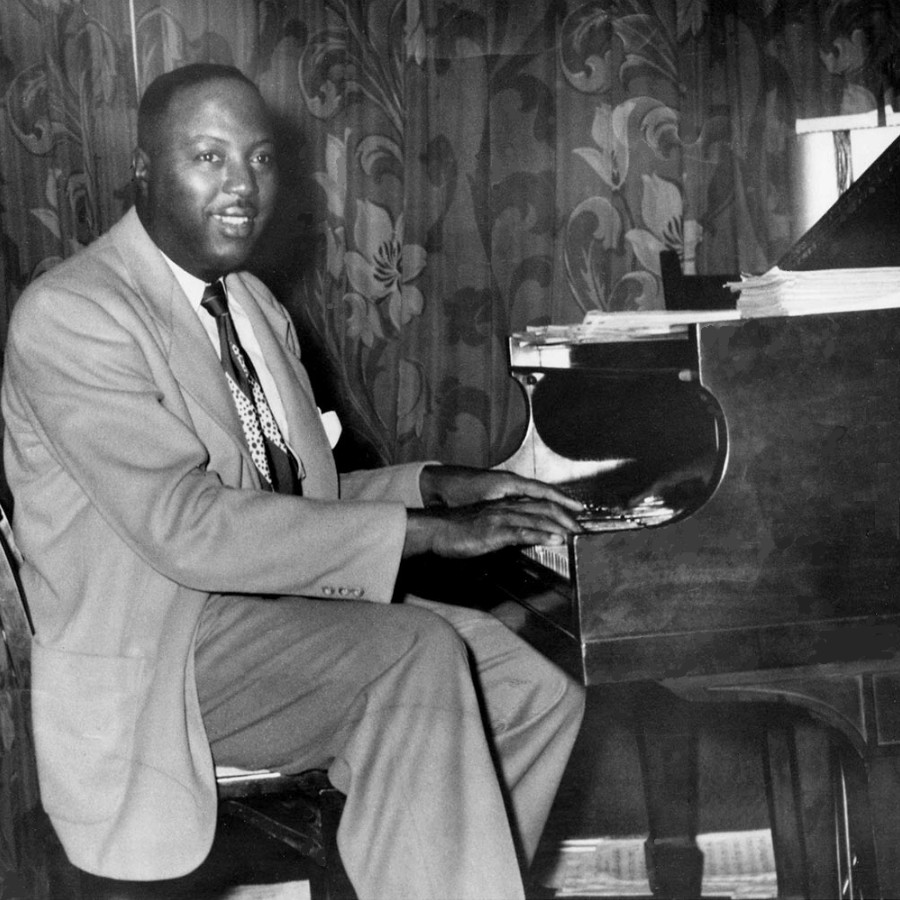
|
Above: 1946 photo of Todd Rhodes, from Detroit, who was a pianist, bandleader, composer, and arranger. He began his career circa 1927 playing piano in the famous McKinney's "Cotton Pickers" band. It was his "Blues For The Red Boy" that opened each Alan Freed Moondog Show on WJW radio in Cleveland.
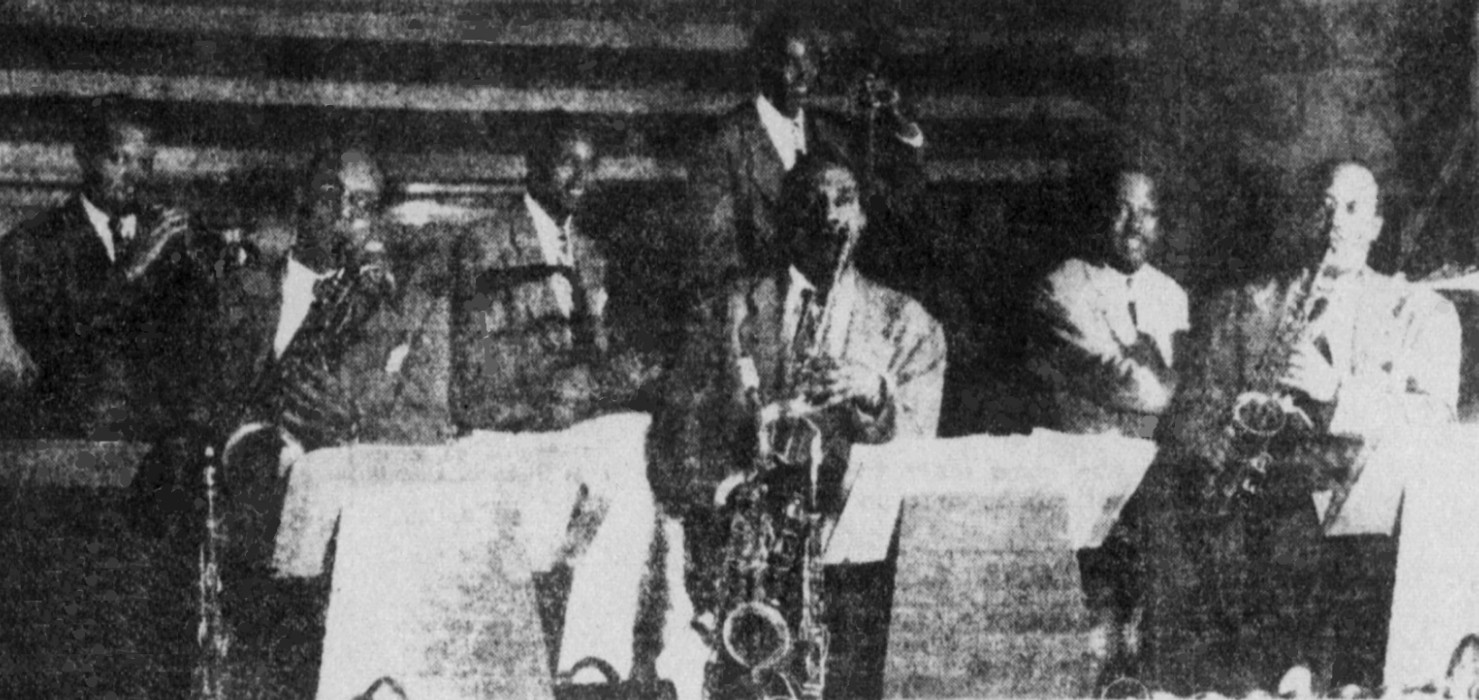
|
Detroit Tribune, August 30, 1947:
Todd Rhodes and his orchestra were the winners of the Detroit Tribune's first annual band poll conducted in the Detroit area.(L-R Front) George Favors (baritone sax), Louis Barnett (tenor sax), Hal Dismukes (alto sax), (L-R) Back) Howard Thompson (trumpet), Huestell Tally (drums), Joe Williams (bass fiddle), and Todd Rhodes (piano).
Todd Rhodes' recordings of "Flying Disc", "Redskin Rhumba", and other tunes are drawing the nickels of Detroit's juke box players.
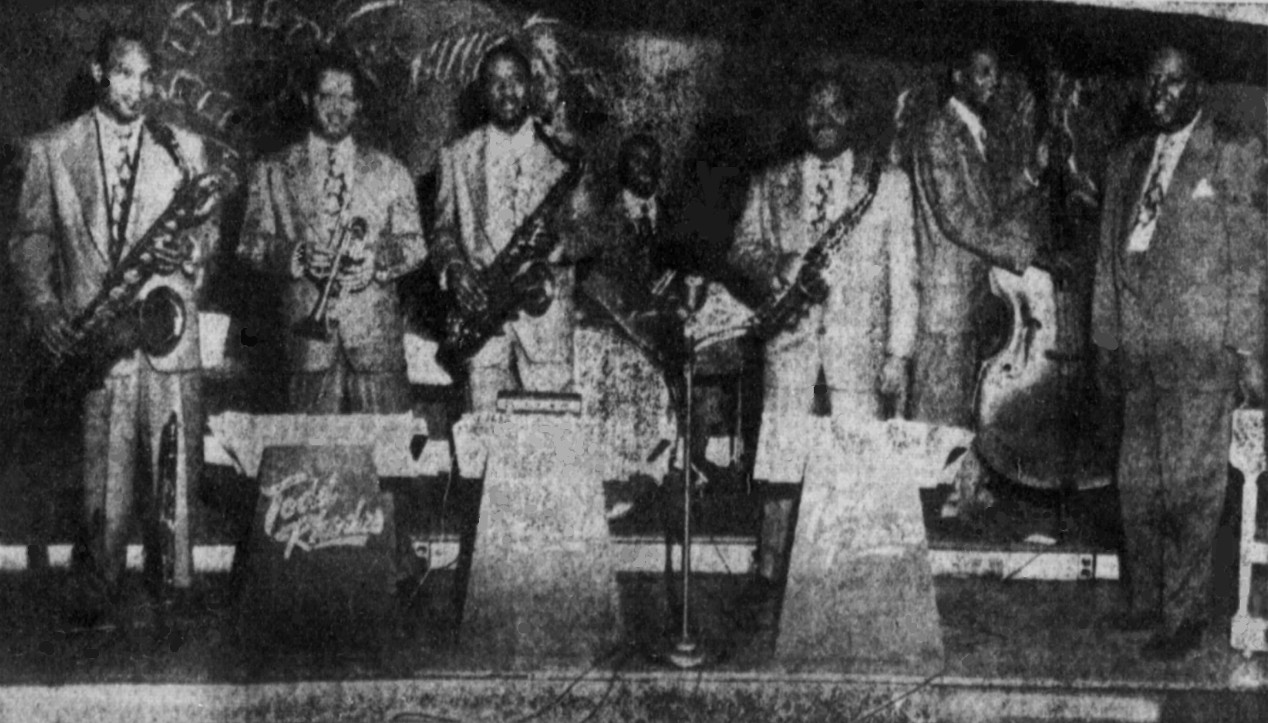
|
Detroit Tribune, May 19, 1948: The Todd Rhodes Orchestra...also known as Todd Rhodes And "His Zombie Rhythmettes", "His Toddlers", and "His Recording Orchestra". Todd is standing at far right.
Above Left: Label image of King 4240-B, released in 1948. This was Alan Freed's theme song for his WJW radio broadcasts in Cleveland. Above Middle: CASH BOX, November 6, 1948.
NOTE: At this time, Todd Rhodes was a featured orchestra at Sportree's Music Bar at 2014 Hastings Street in Detroit. However, Todd and his orchestra would play at many of Detroit's night spots, such as Uzziel Lee's Club Sensation, Flame Show Bar, Broadway Capitol, Club El Sino, and Club Juana.Above Right: Label image of King 4509-A, released in 1951. While the song style is similar to "Blues For The Red Boy", there is more emphasis on piano tinkling than saxophone blasts. Something seems to be off kilter with the saxophones and the other instruments. The record did not rate a review in either The Billboard or Cash Box magazines.
"Red Boy" seems to be a descriptive term for a Native American (Indian). Todd Rhodes also released "Dance Of The Red Skins" (1948) and "Red Boy At The Mardi Gras" (1949).
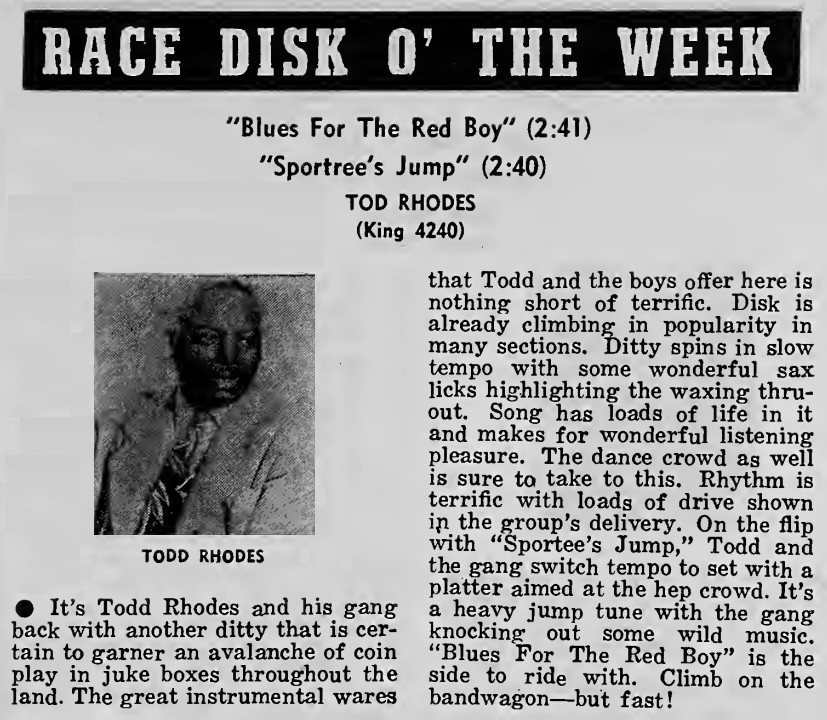
|
LISTEN (Windows Media Player):
1. "Blues For The Red Boy" - Todd Rhodes Orchestra - King 4240-B - 1948.
2. "Red Boy Is Back " - Todd Rhodes Orchestra - King 4509-A - 1951.
3. "Blues For The Red Boy" - Alan Freed WJW Moondog Show Theme Song - 1954.ALL THREE SELECTIONS played in sequence.
THE BILLBOARD, September 27, 1947: VITA EXPANDING INTO RACE DIVISION
CHICAGO—Vita is issuing its first race disk, a two-sider by Todd Rhodes' ork. Platter was originally released seven weeks ago by the Sensation label, opped by Bernie Bessman and Johnny Kaplan of Pan-American Distributors, Vita's Detroit outlet.Deal for Rhodes brought his waxing contract and six more masters into the Vita fold.... Vita's Negro series will be numbered 1,000 and on....
CASH BOX, June 19, 1948:
KING ACQUIRES 64 MASTERS IN DEAL WITH SENSATION RECORDS
CINCINNATI—In keeping with its policy of steadily enlarging its catalog, King Records this past week announced the acquisition and rights thereto of four Todd Rhodes' master recordings.Rhodes, one of the nation's foremost exponents of the hot saxophone, was formerly heard on the Sensation label. His recording of "Bellboy Boogie" was one of the top race songs in the early part of the year.
Sensation Records, who first handled Todd's numbers, later made a deal with Vitacoustic Record Company to turn over to them all of the Todd Rhodes' masters. After the reorganization of Vitacoustic it was necessary for them to revert the masters formerly obtained back to Sensation. King Records recently made a deal with the latter plattery for the Todd Rhodes' masters which they will release under their blue label series.
Sixty other masters were also acquired in the deal with Sensation. Included in these masters are such commendable talent as Lord Nelson–Bebop, Russel Jacquet. Doc Wiley–Blues, Jack Surrell, Sir Charles Thompson, Milt Jackson, L. Sanders, and others.
THE BILLBOARD, January 22, 1949: KING EYES RACE BIZ; INKS BOSTIC, RHODES
CHICAGO—King Records, of Cincinnati, this week expanded further its race roster, with Prexy Sid Nathan inking five-year pacts with Earl Bostic and Todd Rhodes, both jump combo leaders, who previously had records on King, after masters were purchased from other firms. Bostic was formerly with Gotham, while Rhodes had sides on Vitacoustic and Sensation....(NOTE: Earl Bostic was not new to King Records in 1949. He had the first two rhythm and blues series records under the blue King banner in 1947. See the King Records - Part One article for a section featuring Bostic and his orchestra.)
THE BILLBOARD, January 29, 1949: SWINGMASTER IN WAX SWEEPSTAKES
CHICAGO—A new record label, Swingmaster, made its appearance here this week. Swingmaster's moniker comes from its dedication to Al Benson, local Negro platter pilot, who uses that pseudonym, but the label's general manager, Leonard Davis, ex-Mercury purchasing manager, denied that Benson was financially interested.First items for release on Swingmaster are race and jazz items from the now defunct Vitacoustic operation. First releases are by Kitty Stevenson, Howard McGhee's All-Stars, the Four Shades of Rhythm, and Christine Randall.... Davis is currently lining up national distribution.
THE BILLBOARD, January 29, 1949: DENY RHODES INKED BY KING
DETROIT—John S. Kaplan, part owner of the Sensation Record label here, denies reports that King Records has signed Todd Rhodes. Kaplan states his firm has a three-year contract, signed several months before the recording ban, with about a year and a half to go, calling for Rhodes's exclusive recording for Sensation.THE BILLBOARD, August 20, 1949:
KING AND SENSATION SETTLE TODD RHODES CONTRACT JAM
NEW YORK—King Records and Sensation Records this week settled a contract dispute involving blues shouter Todd Rhodes, with King voluntarily voiding a recording contract it had recently made with the warbler. Rhodes thus is recognized as a Sensation property under a prior contract....King also turned back all but five of the masters that it had leased from Sensation, the five having been already pressed and placed on the market....
NOTE: From 1948 to 1954, the Todd Rhodes Orchestra, under its own name, had at least 19 records issued on the King label. This does not include several where they were the backing orchestra for single artists.
In 1948, King released four Todd Rhodes records in a row that were procured from Sensation. "Bell Bottom Boogie"/"Flying Disc" (King 4239) was the third of these, just prior to "Blues For The Red Boy".
LISTEN (Windows Media Player):
1. "Flying Disc" - Todd Rhodes Orchestra - Sensation 2B And Vitacoustic 1001B - 1947.
2. "Bell Boy Boogie" - Todd Rhodes Orchestra - Sensation 2A And Vitacoustic 1001A - 1947.BOTH SONGS played in sequence.
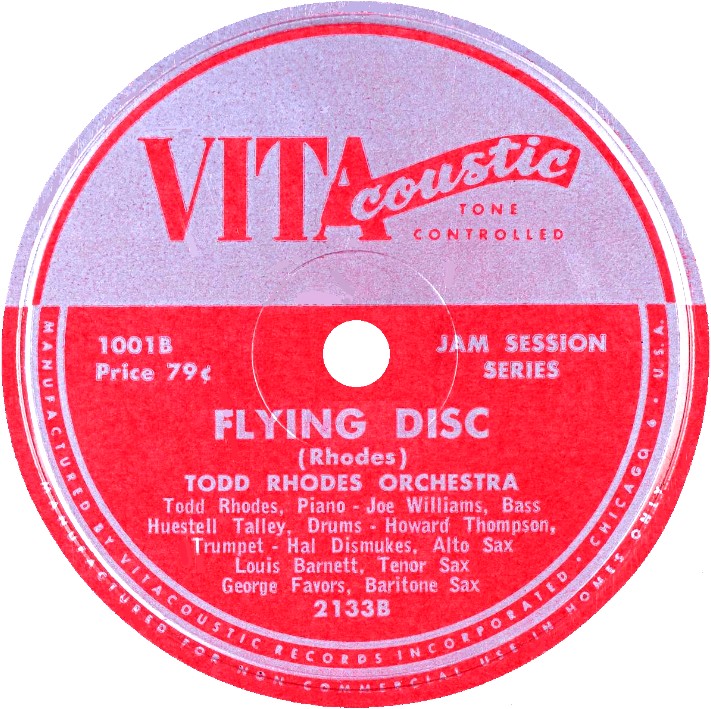
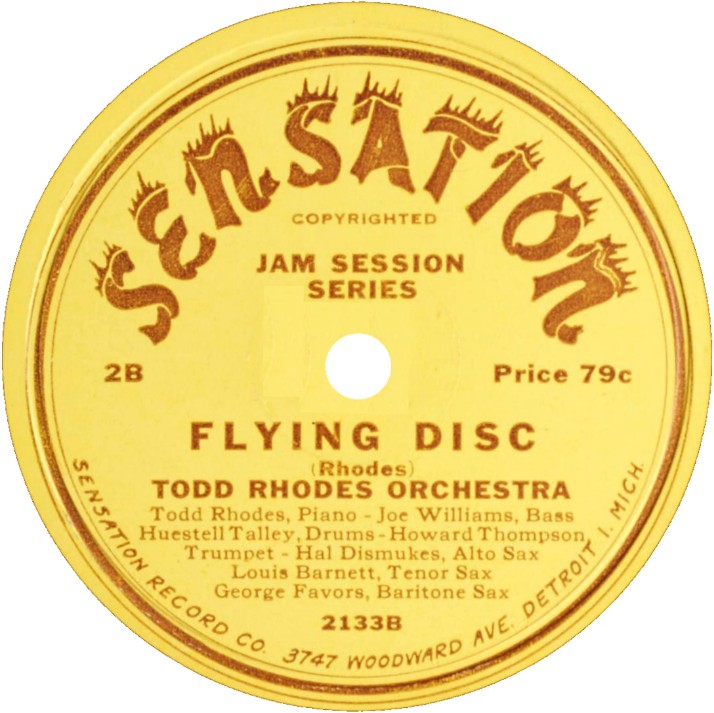
Todd Rhodes had several female vocalists that sang with his band, including Kitty Stevenson, LaVern/LaVerne Baker, Connie Allen, Sadie Madison, Honey Brown, Alberta Adams, Letha Jones, and Rose Mitchell. The first four listed vocalists had records with Todd and are included in this next section.
KITTY STEVENSON
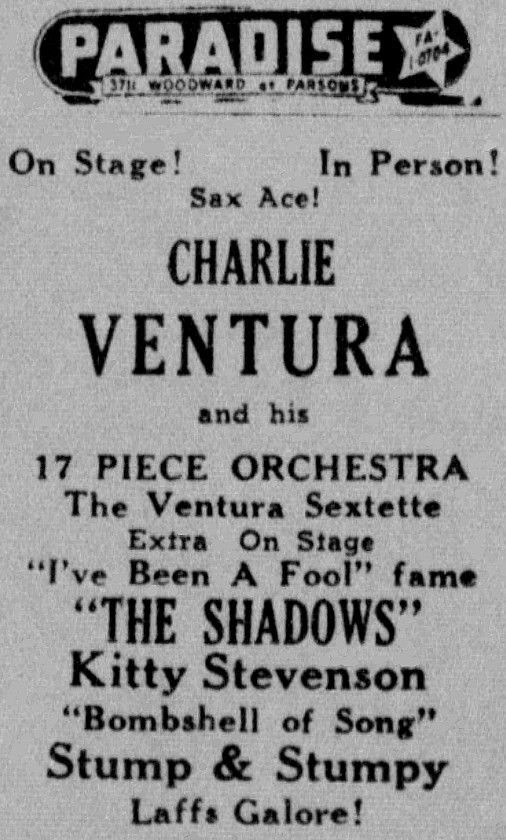
|
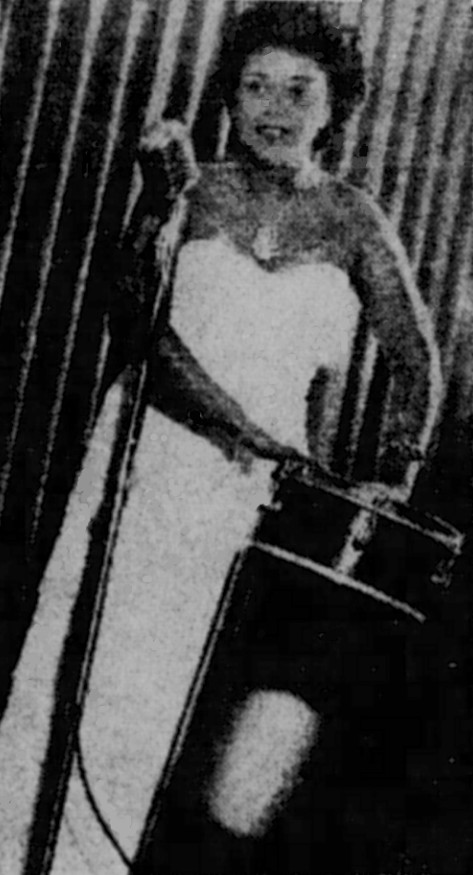
|
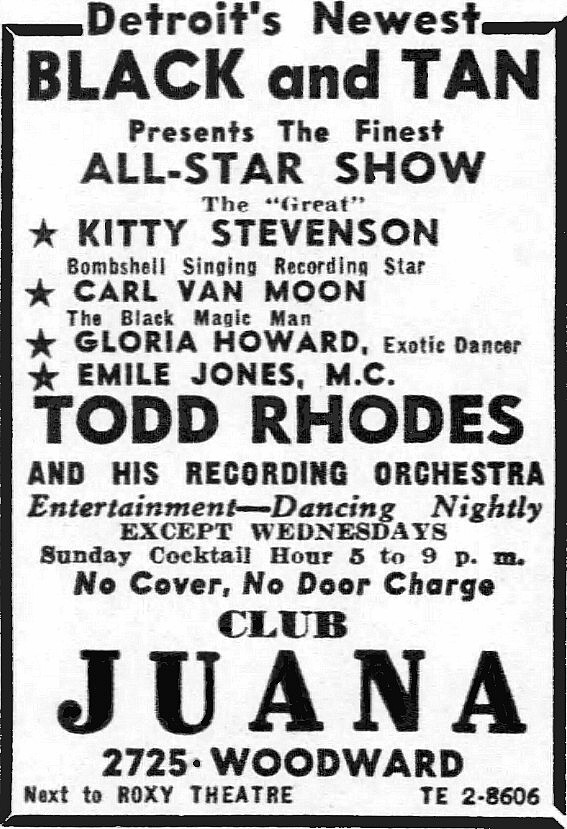
|
Above Left: DETROIT TRIBUNE, February 18, 1950. Above Middle: DETROIT TRIBUNE, August 4, 1951:
BIG SHOW AT LEE'S SATURDAY FOR KITTY
Kitty Stevenson, Detroit's gift to songdom, will be honored with a big benefit party Saturday night, August 4, at Lee's Club Sensation, Owen at Russell. The bouncy and friendly singer, who was a long-time star at the Flame Show Bar before going on the road, underwent a series of medical setbacks recently.Known as the "Brown Bombshell of the Blues", Kitty established a big name for herself song wise around the Motor City. She racked up many accolades when she toured the South with Todd Rhodes' band and went into the Blue Angel in New York City.
It was at Lee's Sensation that Kitty got her singing start, and she became a long-time song favorite at the spot. It was only recently that she began a repeat appearance at the Sensation, with the band of T. J. Fowler and the companion voice of Charles Brooks.
Above Right: DETROIT FREE PRESS, June 23, 1950.
At Direct Right (Top): DETROIT TRIBUNE, December 27, 1949.
At Direct Right (Bottom): NEW YORK AGE, April 21, 1951.
Click HERE for an article about KITTY STEVENSON by Marv Goldberg.
(Will open in a separate window)DETROIT FREE PRESS, November 11, 1949:
....Ever since the Flame Show Bar opened last June, Kitty Stevenson has been singing there. She's recorded "Blues By Myself" and "I'm Satisfied" (Vitacoustic recordings released on Old Swing-Master in 1949), among others....DETROIT TRIBUNE, May 19, 1951:
KITTY STEVENSON KEEPS 'EM HAPPY
If there's one girl in town who knows how to keep people happy by just singing to them, it's Kitty Stevenson, the bouncy soubrette who holds down the feminine song slot at Lee's popular Club Sensation on Owen. (NOTE: "Soubrette" is a saucy or flirtatious young woman.)Miss Stevenson, who once scored big hits with her recordings of "I'm Satisfied" and "That Ain't Right" [sic "It Ain't Right"], recently returned to Lee's after a big show success at the Apollo Theatre in New York City, a booking which brought happy days to her agent, Al Green.
With Miss Stevenson on the Sensation show line is Charles "BeBop" Brooks, the young man of the blues and torch songs. The band of T. J. Fowler provides music for shows and for dancing at Lee's.
DETROIT TRIBUNE, September 15, 1951:
KITTY JOINS BRADSHAW'S BAND ON TOUR
Kitty Stevenson, the local brown bombshell of song, has been signed to go on tour with the band of Tiny Bradshaw, according to reports from her manager, Al Green.Miss Stevenson, who was "discovered" in song at Lee's Sensation Club some time ago, is a top favorite with Detroit audiences.
She scored her first recording success with the Sensation platter, "I'm Satisfied". Her current selling recording, on the King label, is "I Shouldn't Cry", which features the band of Todd Rhodes.
Miss Stevension has been recovering from a recent operation.
DETROIT TRIBUNE, May 3, 1952:
....Vibrant Kitty Stevenson is getting well now at Detroit Memorial Hospital. All her countless friends in Detroit's show world have been keeping an ear turned toward the musical scene to hear Kitty's lush singing tones again....CASH BOX, June 14, 1952:
....Kitty Stevenson, one of the rising blues warblers until she took ill several months ago, passed away in Detroit last week.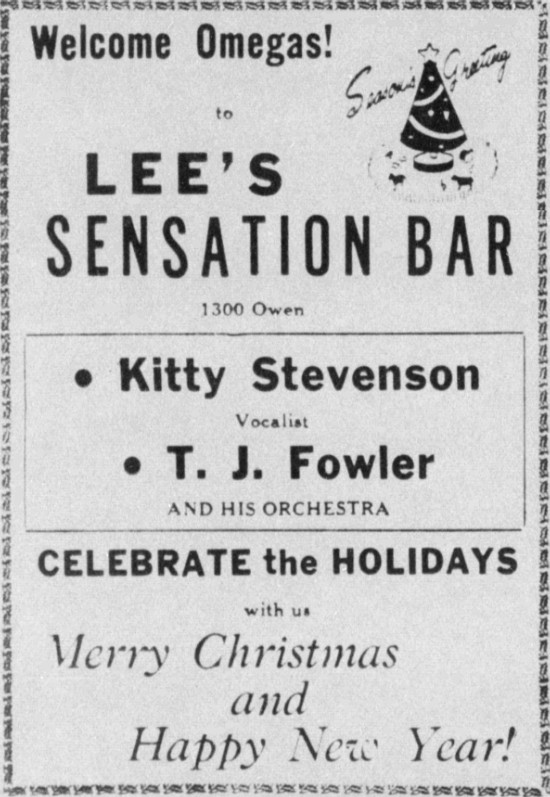
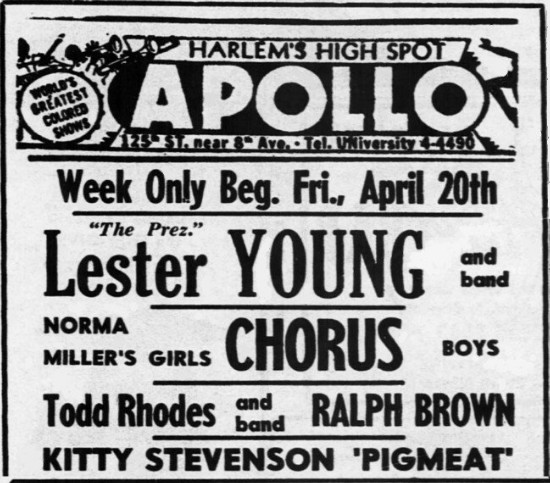
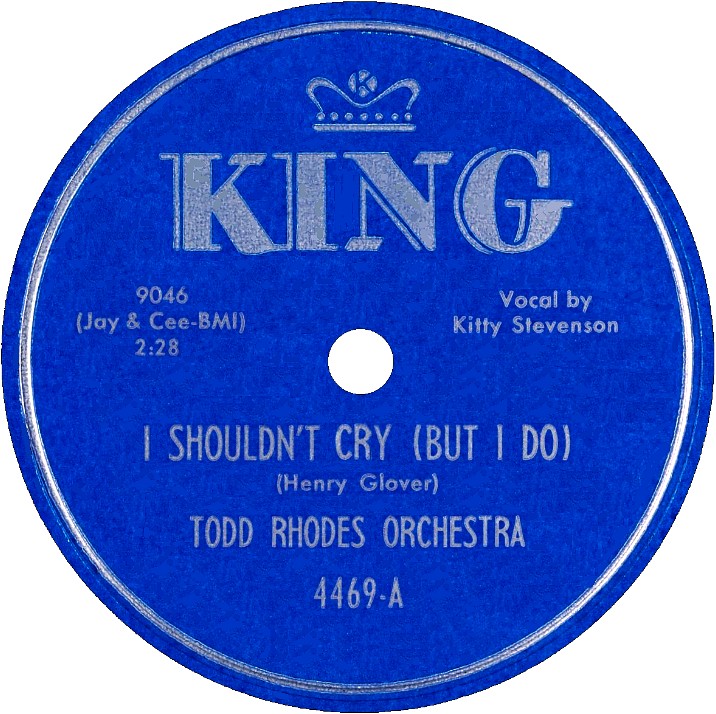
|
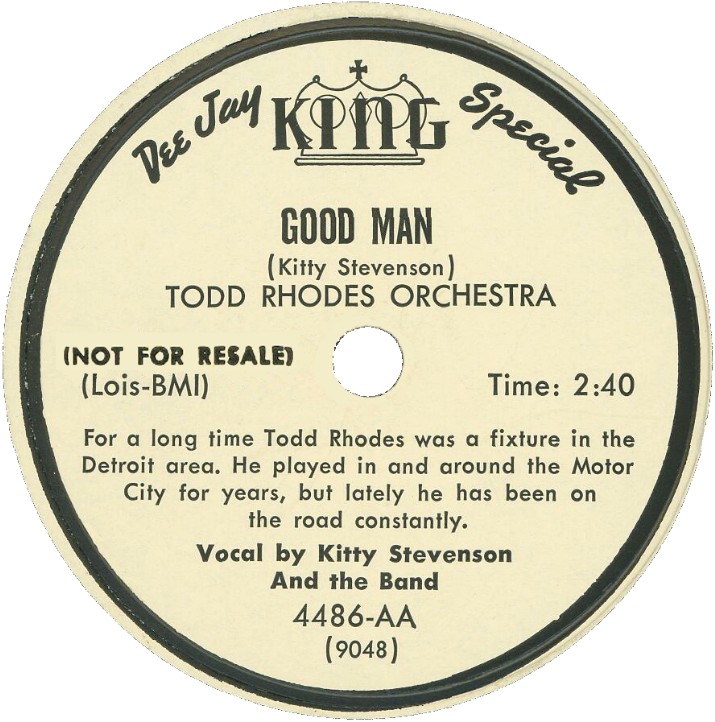
|
Above Left: Label image of King 4469-A, released in 1951. The flip-side, "Gin, Gin, Gin", was composed by Henry Glover and Todd Rhodes. Above Right: Label image of King 4486-AA, released in November 1951. The flip-side is an instrumental.
These two records (one side each) are the only ones Kitty had on the King label.
King Bio DeeJay label: "For a long time Todd Rhodes was a fixture in the Detroit area. He played in and around the Motor City for years, but lately he has been on the road constantly. Todd has the knack of making his small band sound very big. He arranges in such fashion that his combo of alto, tenor, baritone, trumpet, piano, bass and drums sounds much bigger."
At Direct Right: DETROIT FREE PRESS, September 26, 1949.
NOTE: What a great line-up! "Greatest Show" means what it says.The Cash Box Review (8/25/51):
TODD RHODES ORCHESTRA — KING 4469....Gin, Gin, Gin/I Shouldn't Cry
The top deck features the Todd Rhodes orchestra as it sings and plays its way through a lively number. The boys put a lot of zest in this tune and come up with a listenable half. Flip finds chirp Kitty Stevenson doling out the lyrics to a slow blues number. Either end is worth watching.LISTEN (Windows Media Player):
1. "I Shouldn't Cry" - Todd Rhodes Orchestra (Vocal By Kitty Stevenson) - King 4469-A - 1951.
2. "Gin, Gin, Gin" - Todd Rhodes Orchestra (Vocal By The Band) - King 4469-AA - 1951.
3. "Good Man" - Todd Rhodes Orchestra (Vocal By Kitty Stevenson And The Band) - King 4486-AA - 1951.ALL THREE SONGS played in sequence.
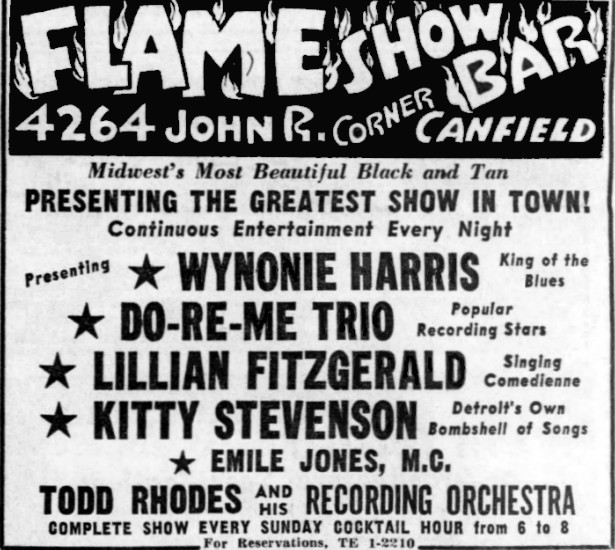
EXTRA RECORD — KITTY STEVENSON
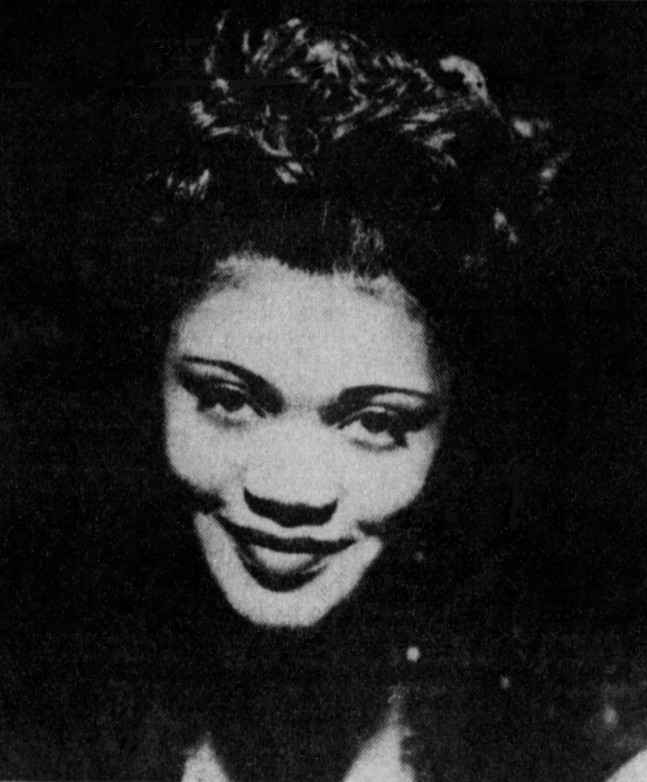
|
Above: DETROIT TRIBUNE, January 8, 1949:
WINSOME WARBLER—Kitty Stevenson, who is appearing on the star-studded revue at Sportree Jackson's Music Bar as a stellar variety vocalist, is also way-out-front on charm (as you can plainly see).
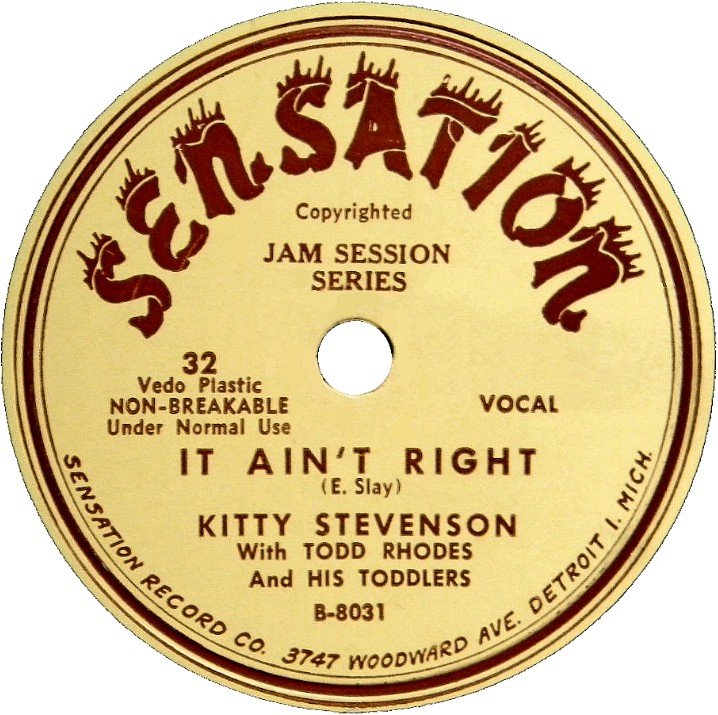
|
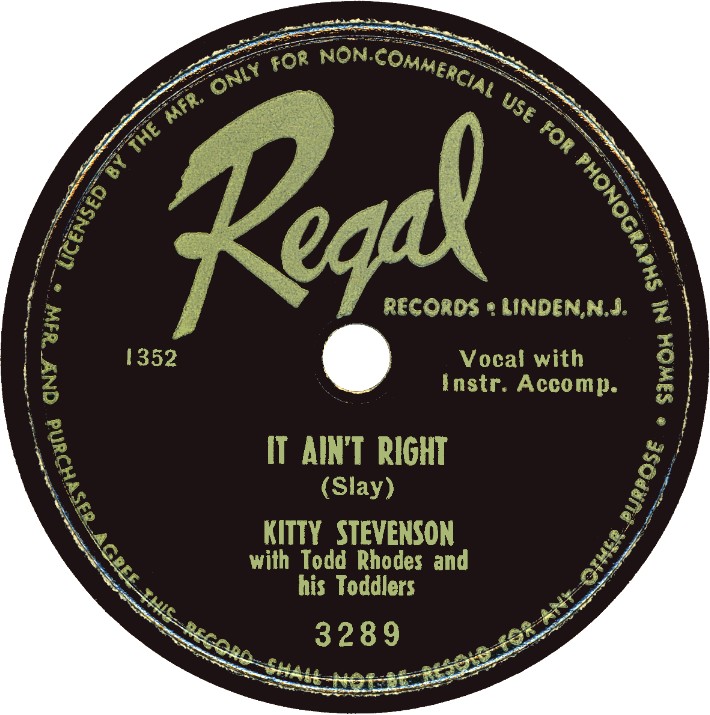
|
Above Left: Label image of Sensation 32, released in March 1950. Above Right: Label image of Regal 3289, released later in 1950.
Composer of "It Ain't Right" is Emmit Slay, a guitarist and singer, who recorded for Sensation Records at the time of this record. The flip-side, "It Couldn't Be True", was written by Kitty Stevenson, as was "Good Man" shown further above.
At Direct Right: DETROIT FREE PRESS, November 11, 1949.
The Billboard Review (5/13/50):
KITTY STEVENSON - TODD RHODES AND HIS TODDLERS — SENSATION 32....
It Couldn't Be True (62) Thrush shows little as she knocks out a mediocre bounce ballad with firm ork support from Rhodes.
It Ain't Right (76) Rocking beat thumps solidly all the way thru this enthusiastic slicing of a light, catchy rhythm piece which is warbled adequately by the chick.(NOTE: A ratings range of 60-69 was considered as "satisfactory" and 70-79 as "good".)
THE BILLBOARD, September 27, 1947:
....Detroit's Sensation Record label, owned by John Kaplan and Bernard Besman, of Pan American Distributors, has been sold to Vitacoustic, but the local company will continue distribution under the old label in Michigan and Ohio....THE BILLBOARD, October 15, 1949:
....Sensation Record Company, headed by John Kaplan and Bernard Besman, of Detroit, recently resumed active pressing and releasing, after ending a tie-up with King Records, and is widening its scope of pressing activity, formerly concentrated in the race field....THE BILLBOARD, October 7, 1950: SENSATION SUSPENDS PRESSING, LEASES OUT
DETROIT—A combination of conditions resulted in a decision by John S. Kaplan and Bernard Besman, owners of the Sensation Record label, to discontinue pressing and lease out their masters.Sensation, with a heavy specialty in the blues and rhythm field, was one of the biggest of the 20 or so independent labels in this area and is quitting the field in good shape, as a sound business move.
Pressing may be resumed at a later date if conditions warrant, Besman said, but the owners will meanwhile concentrate on their other activity, Pan-American Distributors.
The principal reasons for the stoppage were the growing scarcity of both shellac and vinylite and the increasingly poor credit risk presented by record dealers.
About 400 masters of race numbers owned by Sensation are to be leased out for pressing to Regal and Modern Records, with each firm taking about three masters weekly under the present preliminary arrangement, which goes into effect this week for immediate pressings.
LISTEN (Windows Media Player):
1. "It Ain't Right" - Kitty Stevenson - Sensation 32 And Regal 3289 - 1950.
2. "It Couldn't Be True" - Kitty Stevenson - Sensation 32 And Regal 3289 - 1950.BOTH SONGS played in sequence.
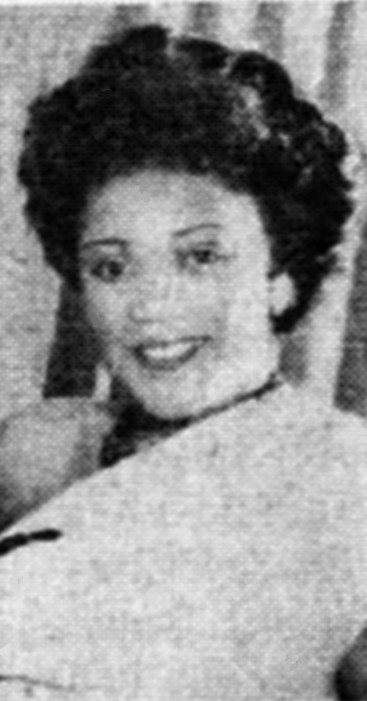
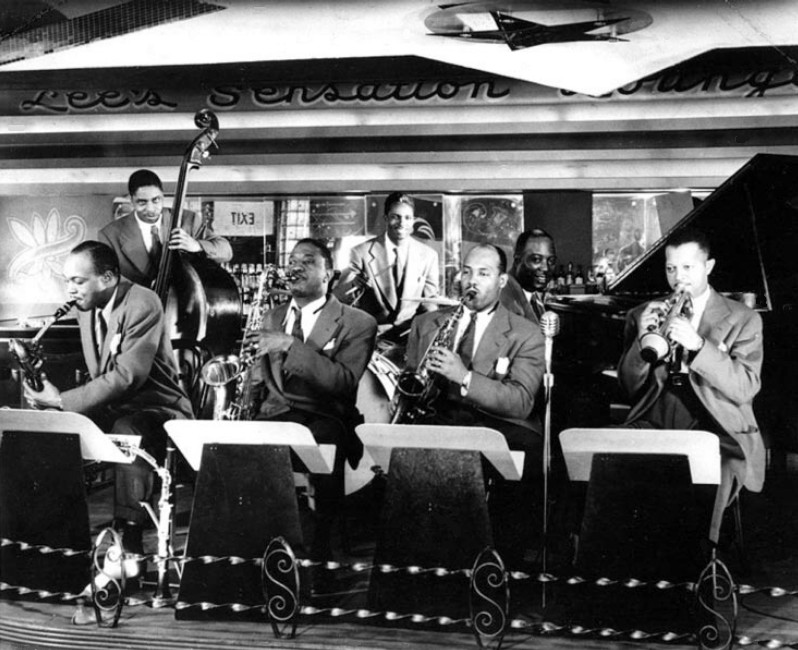
(Todd is in back right playing the piano.) |
CONNIE ALLEN
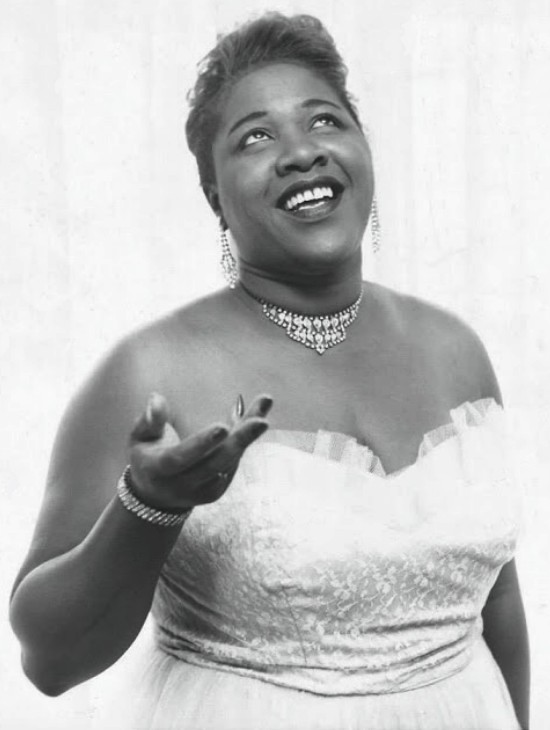
|
Above: Photo of Connie Allen, who was a blues singer.
Above Left: Label image of King 4528, released in 1952. Composers are Henry Glover and Sydney Nathan (the Mann!). The flip-side is an instrumental. Above Right: DETROIT FREE PRESS, January 24, 1955.
DETROIT FREE PRESS, February 1, 1955:
....Club El Sino stages two shows nightly featuring the Mexican dance and comedy trio, Los Colegiales; comedy m.c. Snooky Marsh; blues singer Connie Allen, and the Paul Bascomb orchestra to back the shows and play for dancing....LISTEN (Windows Media Player):
"Rocket 69" - Todd Rhodes Orchestra (Vocal by Connie Allen And The Band) - King 4528 - 1952.
EXTRA RECORD — CONNIE ALLEN (PAUL WILLIAMS ORCHESTRA)
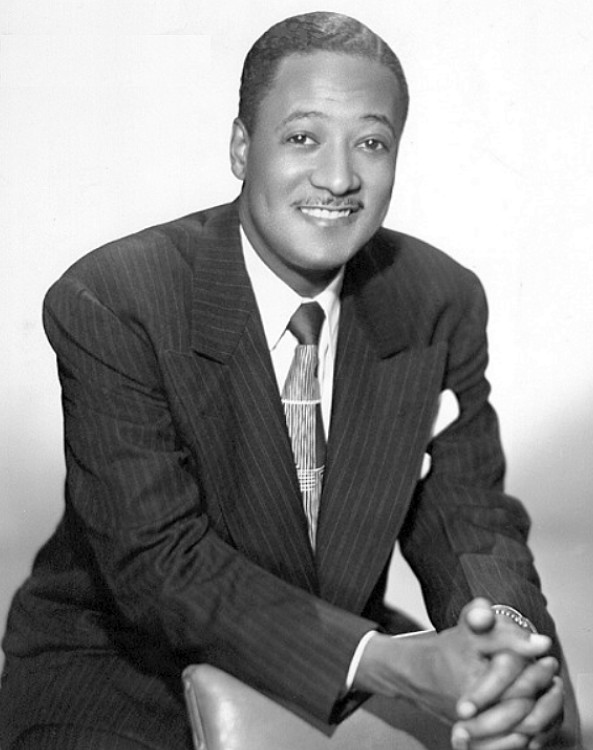
|
Above: Photo of Paul Williams, another Detroit artist, who was a saxophonist, bandleader, and arranger. His big hit, on the Savoy label, was "The Hucklebuck" in 1949, hence the name of his band, "His Hucklebuckers".
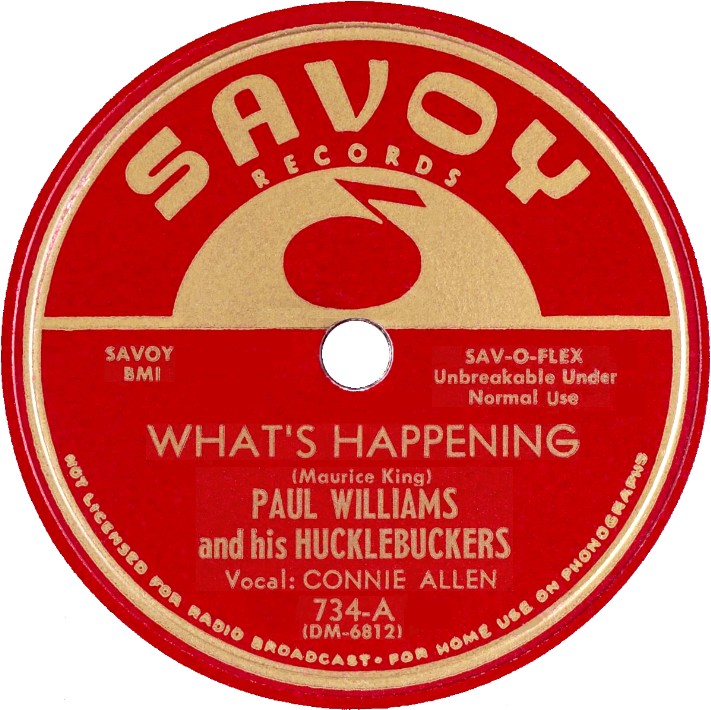
|
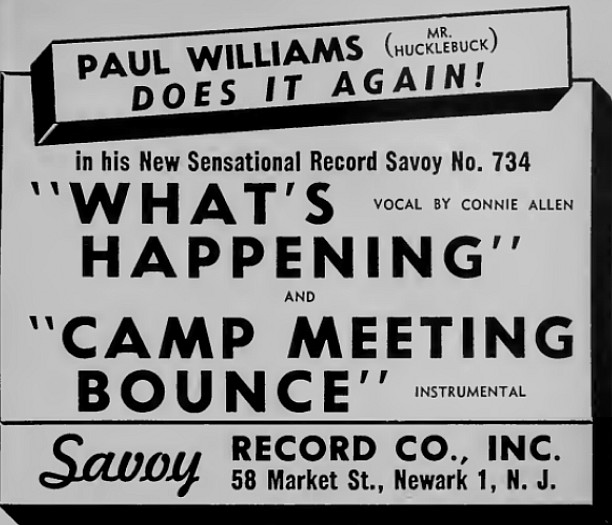
|
Above Left: Label image of Savoy 734-A, released in 1950. In the lyrics of this song, Connie sings "See Mr. Paul and learn to Hucklebuck." The band assists her in the vocalizing. The flip-side is an instrumental. Composer of "What's Happening" is Maurice King. "Maurice King and his Wolverines" were a Detroit band that had releases on Columbia/OKeh in the early 1950's, including backing up Bea Baker (LaVern Baker) on some of them. King also operated a booking office in Detroit, the "Wolverine Theatrical Agency."
Above Right: CASH BOX, March 25, 1950:
LISTEN (Windows Media Player):
"What's Happening" - Paul Williams And His Hucklebuckers (Vocal By Connie Allen And The Band) - Savoy 734-A - 1950.
LaVERN BAKER
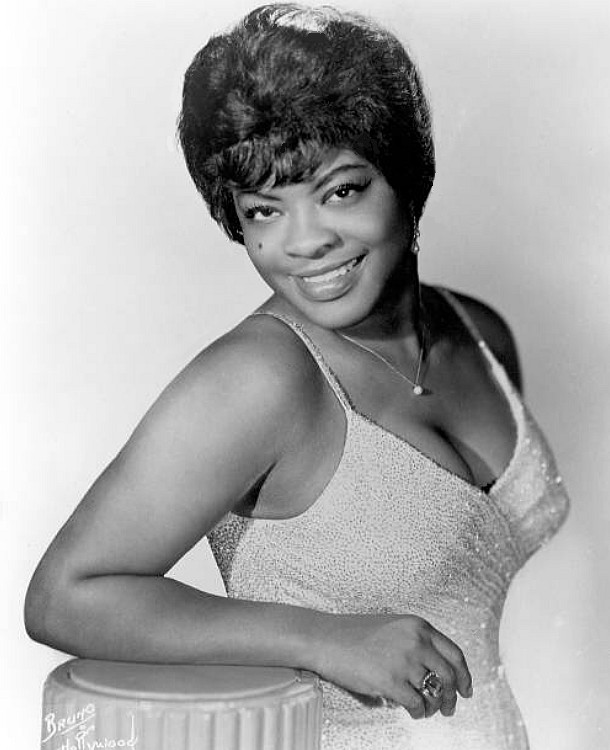
|
Above: LaVern Baker, who grew up in Chicago before moving to Detroit, was a singer, composer, and entertainer.
She recorded under the names Bea Baker, Little Miss Sharecropper, Miss Sharecropper, Laverne Baker, LaVerne Baker, Lavern Baker, and LaVern Baker. She composed songs under the name Delores Williams.
Her first two records were released on RCA Victor in 1949 as "Little Miss Sharecropper". Next was Columbia Records, on their subsidiary label, OKeh, as "Bea Baker". Then over to the National label as "Miss Sharecropper".
LaVern had her hit songs on the Atlantic label, including "Tweedle Dee", "Play It Fair", "Still", and "Jim Dandy".
She was a contemporary, an Atlantic label mate, and a good friend of the great Ruth Brown. In the above photo, LaVern has a Ruth Brown style hairdo. Just a wild theory, but did LaVern have a birthmark so people could differentiate her from Ruth?
Click HERE for an article about LAVERN BAKER by Marv Goldberg.
(Will open in a separate window)
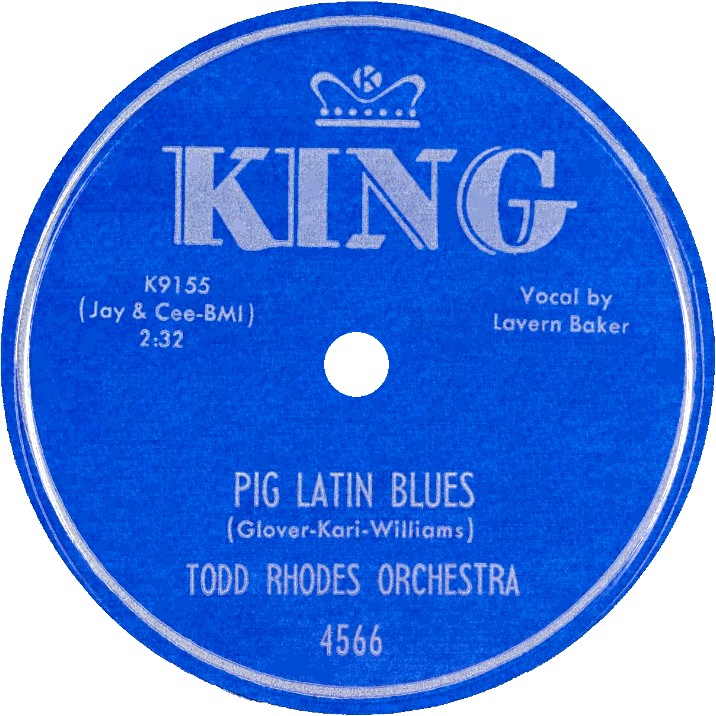
|
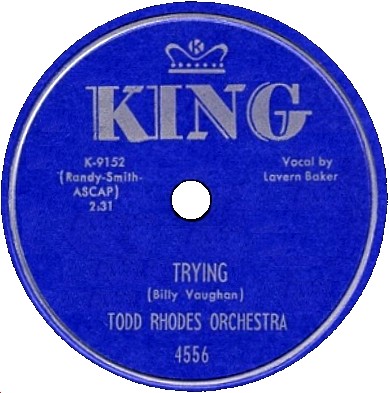 |
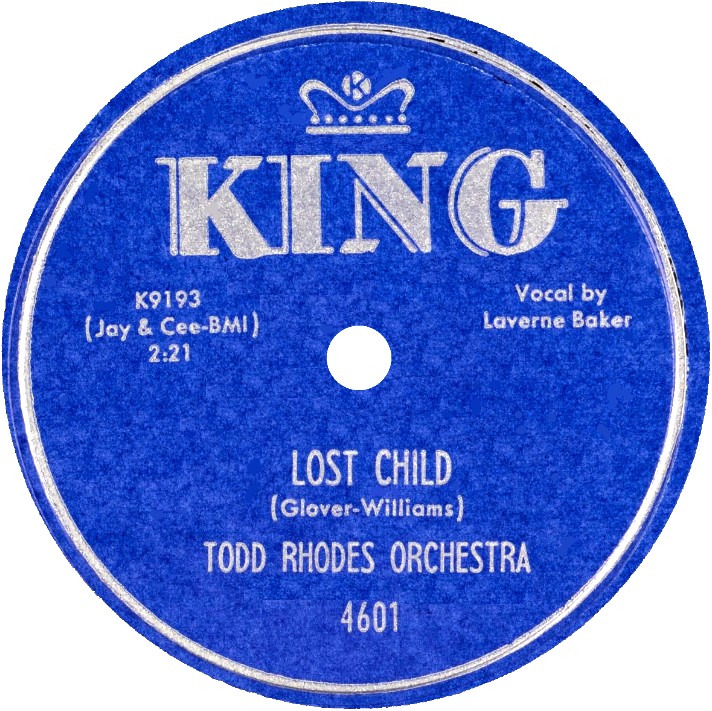
|
Above Left And Right: Label images of King 4566, released in 1952, and King 4601, released in 1953. The flip-sides are instrumentals by Todd Rhodes Orchestra. LaVern Baker had a hand in composing both of the above songs under the name Delores Williams. And our friend, Henry Glover, makes his presence felt again as co-composer on both. The third composer of "Pig Latin Blues" is Sax Kari, a well-known multi-instrumentalist, bandleader, and songwriter.
Above Middle Label image of King 4556, released in 1952.
The famous bandleader, Billy Vaughan, gets credit for writing this song.The Billboard Review (8/30/52):
TODD RHODES ORK — King 4556....
Trying (75) The Rhodes ork builds a moody base for an excellent torchy vocal by Lavern Baker.(NOTE: A ratings range of 70-79 was considered as "good".)
The Cash Box Review (10/11/52):
TODD RHODES ORK — King 4566....
Pig Latin Blues (B)
The Todd Rhodes aggregation dishes up a fast beat novelty in stirring style. Assisting in the vocal department is a fem thrush who chants the lyrics, that sound like double talk, with zest. Side comes off fine and could make noise in the boxes.(NOTE: A rating of B was considered "very good".)
The Cash Box Review (2/28/53):
TODD RHODES — King 4601....
Lost Child (B)
The Todd Rhodes ork come through with a tender item in the moody vein. Laverne Baker handles the vocal end, and the full throated thrush does a potent job. A little more restraint would have gone better with the general tone of the etching.(NOTE: A rating of B was considered "very good".)
LISTEN (Windows Media Player):
1. "Trying" - Todd Rhodes Orchestra (Vocal By LaVern Baker) - King 4556 - 1952.
2. "Pig Latin Blues" - Todd Rhodes Orchestra (Vocal By LaVern Baker) - King 4566 - 1952.
3. "Lost Child" - Todd Rhodes Orchestra (Vocal By LaVerne Baker) - King 4601 - 1953.ALL THREE SONGS played in sequence.
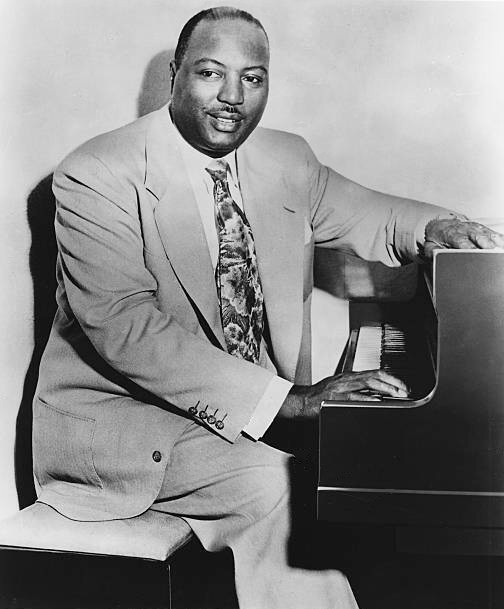
TODD RHODES AT THE PIANO
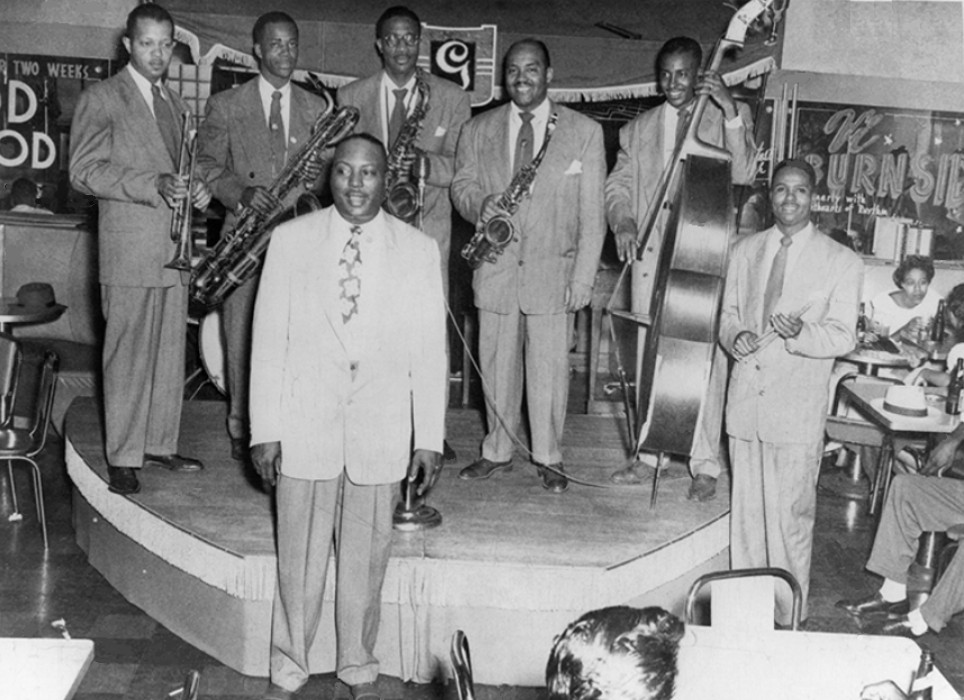
And at top right, Vi Burnside And Her Sweethearts Of Rhythm are being promoted for an upcoming engagement. |
EXTRA RECORDS — LaVERN BAKER
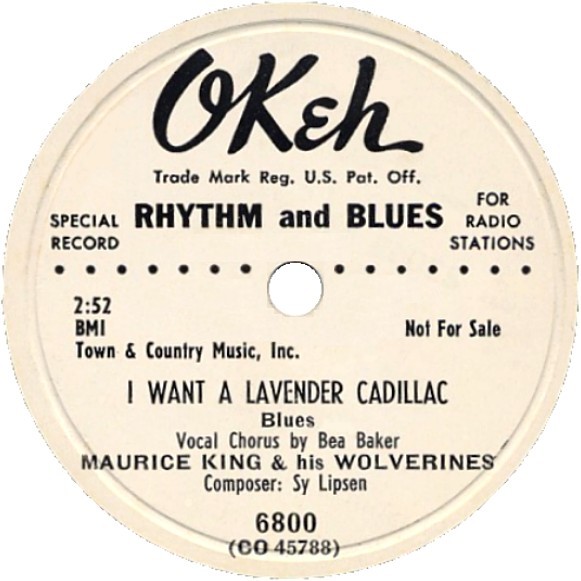
|
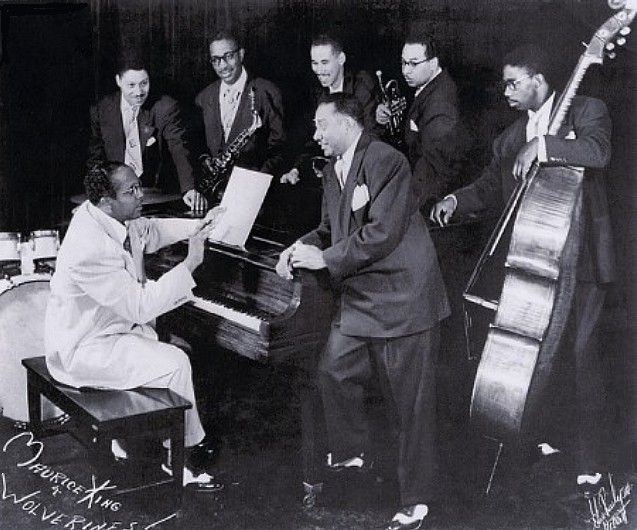
|
Above Left: Label image of OKeh 6800, recorded in March 1951 and released in June 1951. LaVern uses the name "Bea Baker" on this record.
(Label image and audio file provided by Paul Ressler.)Above Right: Maurice King & his Wolverines. From 1944 to 1947, King was Musical Director and European Tour Manager for the International Sweethearts Of Rhythm, the famous all girl orchestra.
In 1950, he formed The Wolverines consisting of King (alto sax), Thomas Bowles (baritone sax), Louis Barnett (tenor sax), Russell Green (trumpet), Neil Robinson (piano), Clarence Sherrill (bass), and Elbert Langford (drums).
LISTEN (Windows Media Player):
"I Want A Lavender Cadillac" - Maurice King & His Wolverines (Vocal By Bea Baker)
- OKeh 6800 - 1951.
ALABAMA TRIBUNE, June 22, 1951: TOP NEGRO ARTISTS TO BE ON "OKEH"
NEW YORK—A number of top-flight Negro artists will appear on the revived Okeh record label, a subsidiary of Columbia Records, which has been inactive since 1942. ....First releases on the one-time popular label will be available about June 20........lined up for the label are Arnett Cobb, Al Russell, the Do Re Mi Trio, Sugar Tones, the Treniers, Big Three Trio, Red Saunders, Johnny Ray, Bill Davis Trio, and Bea Baker.
(NOTE: Interesting that Johnny Ray is listed as a Negro artist.)The initial release will consist of a pair of new rhythm and blues platters by both Red Saunders and Maurice King and the Wolverines.
....Columbia is shifting its entire r. and b. roster to Okeh, including both artists and directors....
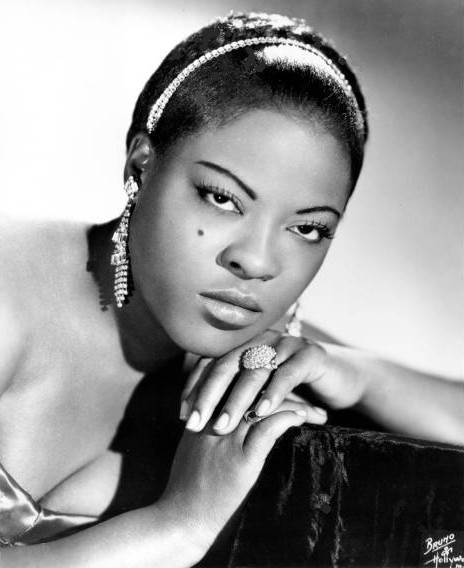
|
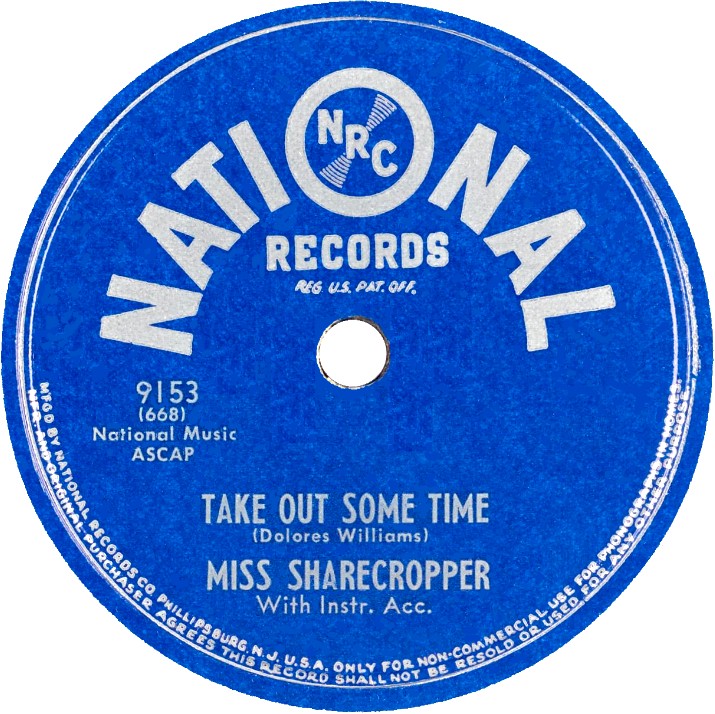
|
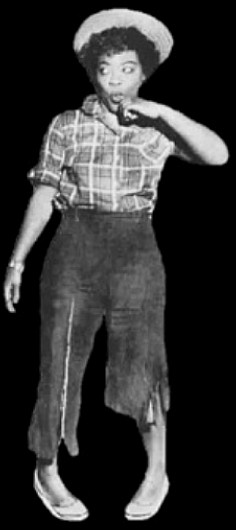
|
Above Left: Photo of LaVern Baker. Above Middle: Label image of National 9153, released in 1951.
Above Right: LaVern Baker's "Miss Sharecropper" persona. It's a total transformation. Even the beauty mark on her face is gone.
PITTSBURGH COURIER, February 7, 1953:
....(LaVern Baker) inherited the name "Miss Sharecropper" from Freddie Williamson, vice president of ABC, who needed another "Miss Cornshucks". After hearing the talented singer, Williamson decided to send her out on her own as "Miss Sharecropper".LISTEN (Windows Media Player):
1. "Take Out Some Time" - Miss Sharecropper - National 9153 - 1951.
2. "I Want To Rock" - Miss Sharecropper - National 9153 - 1951.BOTH SONGS played in sequence.
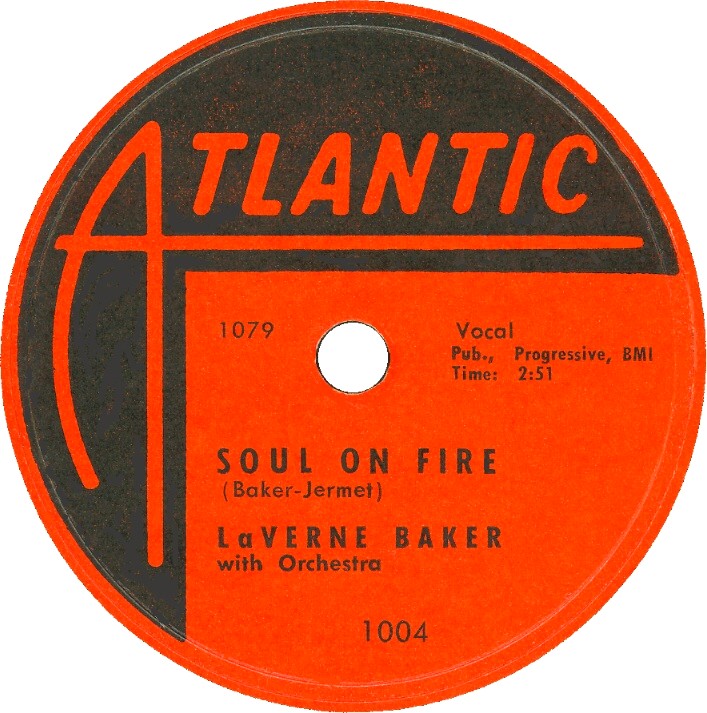
|
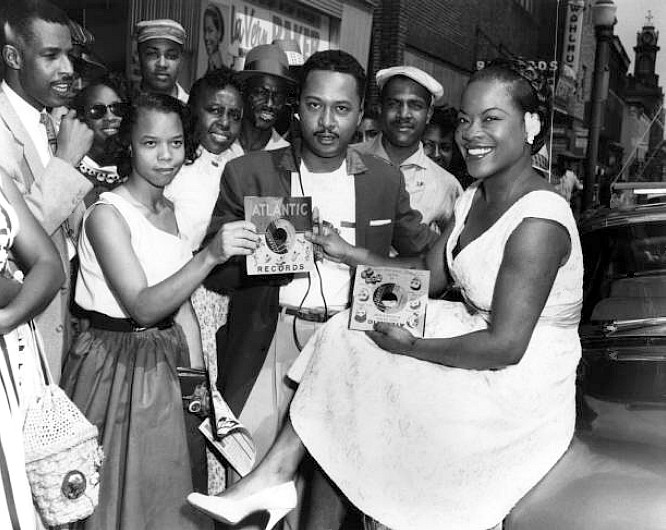
|
Above Left: Label image of Atlantic 1004, recorded on June 19, 1953 and the record released in August 1953. Composers are LaVern Baker and two Atlantic executives, Jerry Wexler and Ahmet Ertegun. By the way, BMI.com credits 130 different "Soul On Fire" songs. Above Right: Photo of LaVern Baker with her fans.
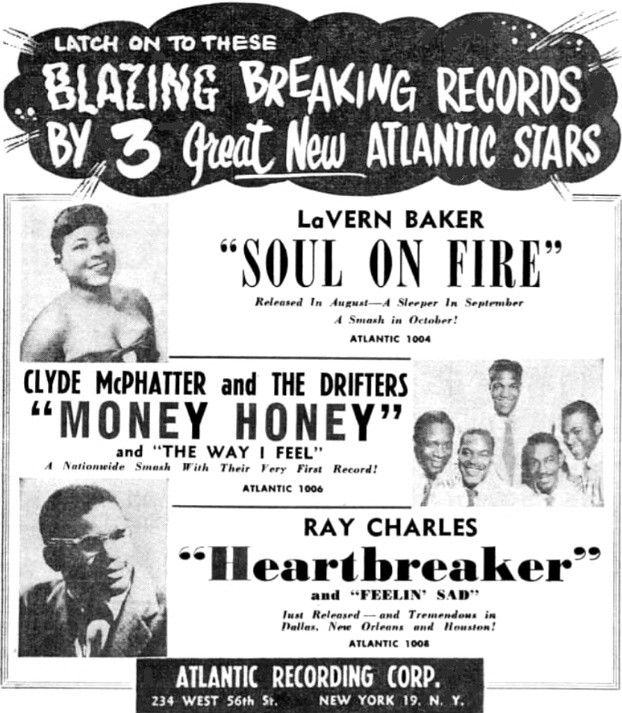
|
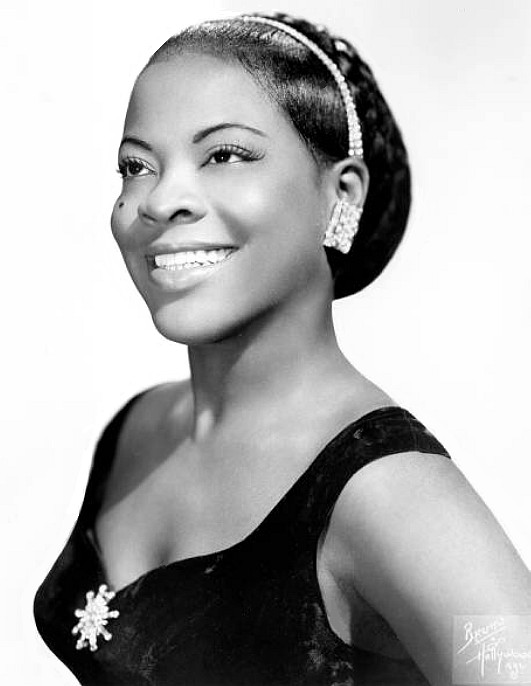
|
Above Left: THE BILLBOARD, October 24, 1953: Above Right: Photo of LaVern Baker. THE CASH BOX, May 30, 1953:
....Atlantic Records signed two new artists last week. LaVerne Baker (formerly Miss Sharecropper) and Carmen Taylor. Miriam Abramson expects big things from the newly inked pair....(NOTE: Carmen Taylor was first with a record, "Ding Dong"/"Lovin' Daddy" on Atlantic 1002. It was good fortune that they saved "Soul On Fire" for LaVern.)
NEW YORK AGE, June 27, 1953:
....Laverne Baker, lovely singer who just played the Apollo theatre last week, is another product of Detroit that has made good in the Big City. I don't understand why they would tag her with that terrible billing "Miss Sharecropper" and Al Green, her manager, should know better....
The Billboard Review (8/29/53):
LaVERNE BAKER — Atlantic 1004....
Soul On Fire (70) Blues-singing thrush does a fine job on a most attractive blues ballad opus while the ork backs her with a strong beat . Good wax, this.(NOTE: A ratings range of 70-79 was considered as "good".)
LISTEN (Windows Media Player):
"Soul On Fire" - LaVerne Baker - Atlantic 1004 - 1953.
SADIE MADISON
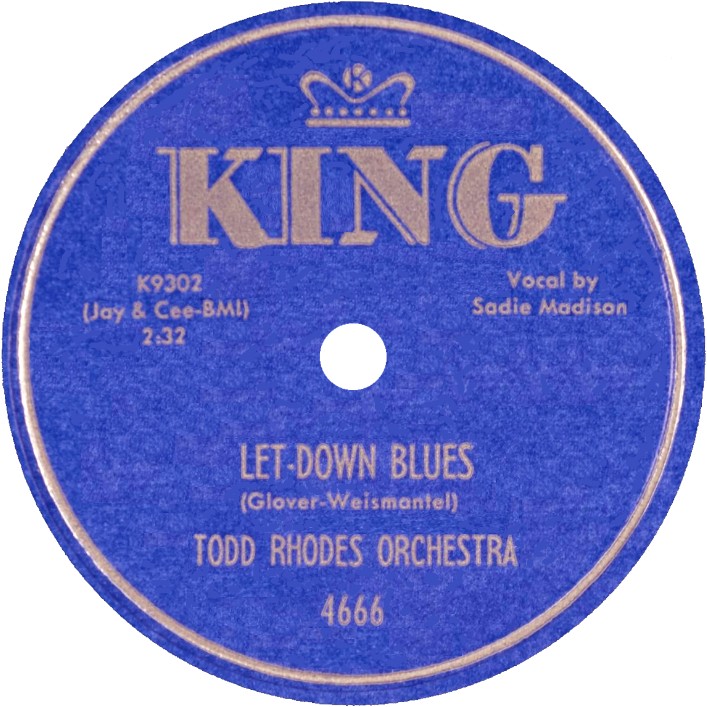
|
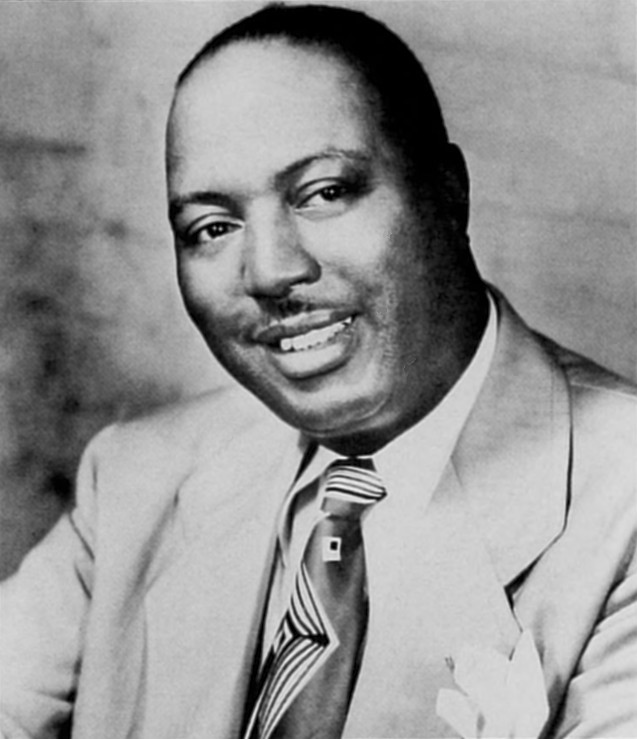
|
Above Left: Label image of King 4666, recorded on June 20, 1953 and the record released in 1953. "Let-Down Blues" has interesting sound effects throughout (train, footsteps, knocking on door). Sadie sings in a similar style as Little Esther, who was on King's subsidiary label, Federal, but left the company in 1953, the year of this record's release.
"Let-Down Blues" was composed by Henry Glover and Fred Weismantel. Glover wrote 633 songs (BMI), Weismantel wrote 217 songs (ASCAP), and of these they wrote 18 songs together. They were both A&R men for King Records.
The flip-side, "Possessed", is an instrumental featuring Lefty Edwards on tenor sax.
Above Right: Photo of Todd Rhodes. He had quite the collection of interesting ties.
The Billboard Review (11/7/53):
TODD RHODES ORK — King 4666....
Let Down Blues (75) First-rate vocal by chirp Sadie Madison, train sounds and chatter bits combine for a strong mood blues reading. Cute tag line adds interest.
Beet Patch (70) Routine instrumental effort here with a good beat.(NOTE: A ratings range of 70-79 was considered as "good".)
LISTEN (Windows Media Player):
1. "Let-Down Blues" - Todd Rhodes Orchestra (Vocal By Sadie Madison) - King 4666 - 1953.
2. "Beet Patch" - Todd Rhodes Orchestra - King 4666 - 1953.BOTH SONGS played in sequence.
NOTE: Sadie does a very nice job on this side. It's surprising there is so little to be found about her. King Records did not promote her or advertise her record in either The Billboard or Cash Box magazines. Is it possible that "Sadie Madison" is a pseudonym for someone else? Perhaps under contract to another record company?
If anyone can provide a photo of Sadie or any other pertinent information, please email "webmaster" using the link at the bottom of this page.
ADDED (7/18/24): Per Marv Goldberg, Sadie seems to have been born in Detroit on May 7, 1926. Marv found no more information about her.
So, apparently, she did exist under that name. It was a nice achievement to have a record released, even if just one side, by an "unknown" singer.
NOTE: Restoration of photos, clippings, record label images, and audio files is by Tony Fournier.
KING RECORDS - PART ONE FEATURES BULL MOOSE JACKSON, THE FOUR BLUE JACKETS, ANNISTEEN ALLEN, LUCKY MILLINDER, BILL JOHNSON AND HIS MUSICAL NOTES, THE JUBALAIRES, AND EARL BOSTIC AND HIS ORCHESTRA. ALSO INCLUDED IS A SECTION ON SYDNEY NATHAN, OWNER AND PRESIDENT OF KING RECORDS. AND SPOTLIGHTS ON THE SONGS "I KNOW WHO THREW THE WHISKEY IN THE WELL" AND "I'VE WAITED ALL MY LIFE FOR YOU".
KING RECORDS - PART TWO FEATURES LONNIE JOHNSON, LAVERN BAKER AND THE GLIDERS, THE STRIDERS, WYNONIE HARRIS, ROY BROWN, MABEL SMITH (BIG MAYBELLE), TINA DIXON, AND IVORY JOE HUNTER.
ALSO INCLUDED IS A SECTION ON KING RECORDS AND SYDNEY NATHAN, OWNER AND PRESIDENT OF KING RECORDS. AND SPOTLIGHTS ON THE SONGS "TOMORROW NIGHT", PLEASIN' YOU", AND "GOOD ROCKING TONIGHT".
KING RECORDS - PART THREE FEATURES TINY BRADSHAW, EDDIE "CLEANHEAD" VINSON, JOE THOMAS AND HIS ORCHESTRA, MABEL SCOTT, SARAH McLAWLER, THE SYNCOETTES, AND PERCY MAYFIELD.
ALSO INCLUDED IS A SECTION ON KING RECORDS AND SYDNEY NATHAN. AND SPOTLIGHTS ON THE SONGS "AFTER YOU'VE GONE", "T-99 BLUES, AND "TWO YEARS OF TORTURE".
KING RECORDS - PART FIVE FEATURES EXTENSIVE COVERAGE OF THE SWALLOWS AND THE CHECKERS. ALSO, SECTIONS ON JIMMY RUSHING, DUKE HAMPTON, ELETRA HAMPTON, AND THE HAMPTON SISTERS, AND THE FIVE JETS. AND A SPOTLIGHT ON THE SONG "BICYCLE TILLIE".
KING RECORDS - PART SIX FEATURES EXTENSIVE COVERAGE OF THE "5" ROYALES AND STICKS McGHEE. ALSO, SECTIONS ON ROY BROWN, THE MAGIC-TONES, CHRISTINE KITTRELL, THE ROYAL SONS QUINTET, THE STRANGERS, AND SUGAR RAY ROBINSON. AND A SPOTLIGHT ON THE SONG "DRINKIN' WINE, SPO-DEE-O-DEE".
KING RECORDS - PART SEVEN FEATURES EXTENSIVE COVERAGE OF CHARLIE FUQUA'S INK SPOTS AND THE ADMIRALS/SULTANS. ALSO, SECTIONS ON RALPH WILLIS, BUBBER JOHNSON, BONNIE LOU, THE HARMONAIRES, AND THE HURRICANES. AND SPOTLIGHTS ON THE SONGS "SOMEONE'S ROCKING MY DREAM BOAT" AND "CLOSE YOUR EYES".
1. "Maybe Some Rainy Day" - Bixie Crawford (With Buddy Banks And His Notes) - King 4309-A - 1949.
ALL TWENTY–FOUR ABOVE KING LABEL SONGS played in sequence.
|
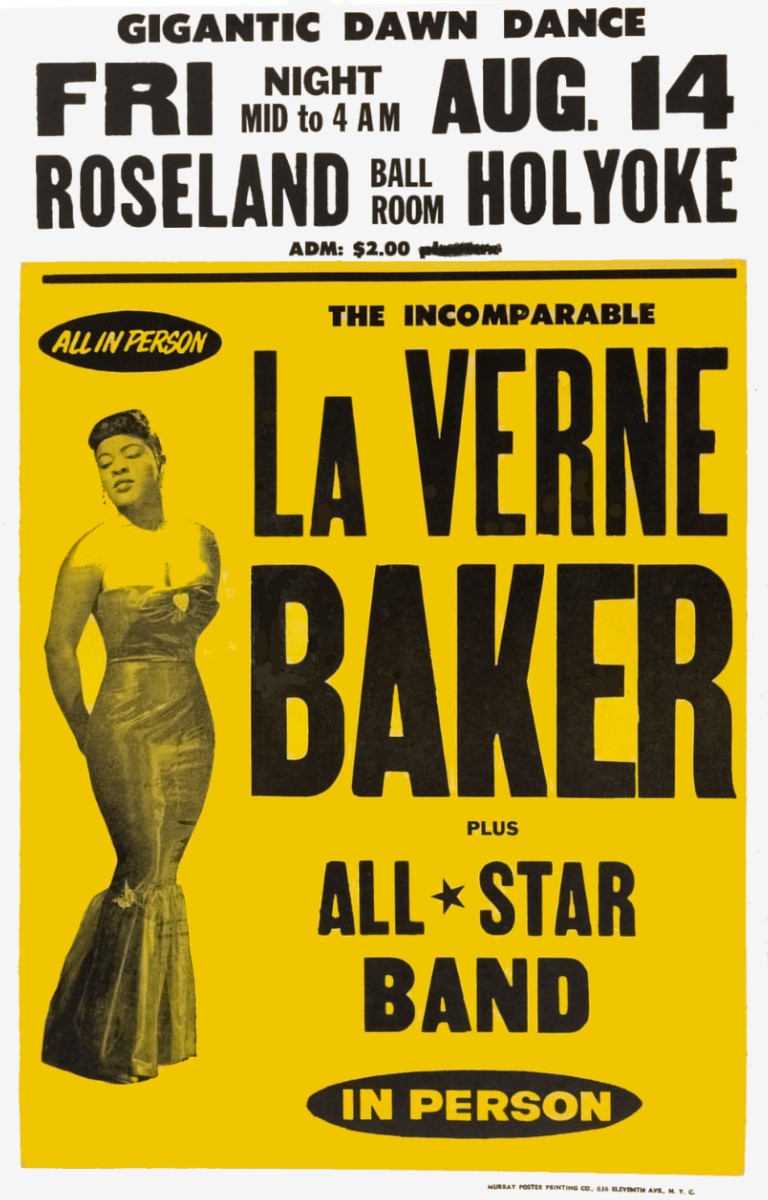
|
Last Update: July 17, 2024
E-mail Me: